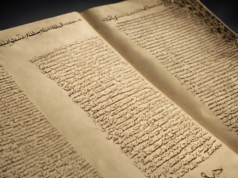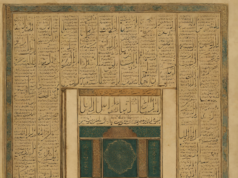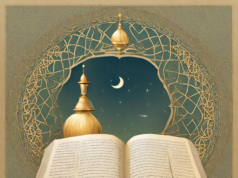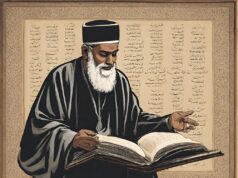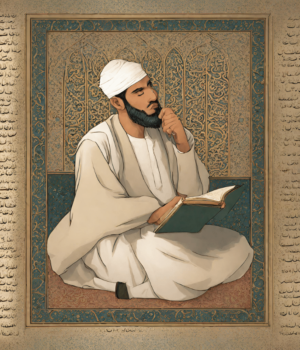
Evidence of Ghuluww in the current narrative and the mission of Al-Islaah in reviving the true teachings of the Quran, the Sunnah of the Prophet (s) and the teachings of the Aimmah (as).
It should be abundantly clear to anyone who has deeply studied Islam in general, and Twelver Imāmī Shīʿaism in particular, that there have been very clear departures away from the teachings of the Qur’ān and the Sunnah of the Prophet (s), as well as the teachings of the Imams of the Ahlul Bayt (as), in the 14 centuries that separate us from their blessed times.
Only those in an echo chamber— hearing their own narrative and disconnected from the realities and hard evidence in the earliest sources— can ignore this fact. This can only be undone with a sincere and critical investigation into the long, tumultuous history of the Shia faith and its evolution. Such inquiry reveals that Shīʿism does not possess a smooth, stable, or fixed creedal belief system or jurisprudence that has been universally accepted or unanimously endorsed by all its scholars across the centuries. Instead, it has been characterised by diverse sub-sects, conflicting intellectual trends, and differing epistemological approaches from its inception. These differences have often led to competition and conflict, resulting in the shifting of mainstream positions over time, such that fringe ideas once deemed deviations or extremism have, through historical, political, and social forces, emerged as the new orthodox mainstream beliefs.
There is ample evidence that the popular, current-day Twelver Imāmī version of Shīʿaism (or what is often referred to as mainstream Twelver Imāmī Shīʿism) is not an accurate or authentic reflection of the original Islam, and the actual teachings of the Qur’ān and the Ahlul Bayt (as), nor is it even a fair representation of the earliest kind of Shīʿism which was found among the earliest generations. In fact, the Twelver Imāmī sect has evolved a lot, and it has moved away and deviated from so many of its own original sectarian beliefs and practices, and these departures are not limited to minor divergences or interpretive nuances but extend to significant innovations that affect core aspects of belief and practice.
Over time, various extreme and unorthodox, theological, legal, and mystical ideas have infiltrated the core teachings, often distorting the original intent of the teachings of the Qur’ān, Sunnah, and the Imams of the Ahlul Bayt (as). This shift has led to the rise of speculative doctrines, historical narratives, and cultural practices and rituals that would have been unrecognizable to the early Shīʿa community. Such deviations highlight the need for urgent reassessment and reform in light of the foundational sources of Islam, to ensure that the authentic teaching of the Ahlul Bayt (as) remains clear and untainted.
The sea change and radical U-turns which the mainstream Shīʿa belief and practice has seen and witnessed over the centuries can only be compared to a breathtaking (or horrifying, depending on the spectator) somersault – flipping what was once deemed dangerous, unacceptable and intolerable deviation into standard, mainstream orthodox doctrine which must be believed in order to retain membership of the sect.
Candid Scholarly Confessions of the Shift in Mainstream Imami Shia Belief
These dizzying U-turns and upside-down shifts, which have redefined the sect’s theological landscape, have been recognized even by the highest levels of critical scholarship within the sect. We notice, for instance, how the grand traditional Twelver Imāmī Shīʿa Ayatullah Shaykh ʿAbdullāh al-Māmaqānī1 (d. 1351 AH), had to repeatedly reiterate the following observation throughout numerous Rijālī (biographical) entries in his voluminous encyclopedia of ʿIlm al-Rijāl entitled Tanqīḥ al-Maqāl fī ʿIlm al-Rijāl as he sought to overturn the Rijālī gradings of Ghulāt (extremist exaggerators) whose credibility was impugned by classical Imāmī scholars due to their fabricating and transmitting lies about Imams (as). He writes:
وتلخيص المقال؛ إنّ المتتبّع النيقد يجد أنّ أكثر من رمي بالغلو بريء من الغلوّ في الحقيقة، وأن أكثر ما يُعَدُّ اليوم من ضروريَّات المذهب في أوصاف الأئمّة عليهم السلام كان القولُ به معدودا في العهد السابق من الغلوّ
“In short, the discerning and diligent critic will find that most of those who were accused of Ghuluww (extremism and exaggeration) (by the classical Imāmī scholars) were in fact innocent and free of Ghuluww in reality, and that indeed MAJORITY of what is considered to be among the Ḍarūriyyāt al-Mazhab (core, essential, non-negotiable, foundational beliefs of the Twelver Imāmī Sect) today, particularly in relation to the attributes and descriptions of the Imams (as), was considered in the earlier period to be Ghuluww (deviant, ideological extremism) and Irtifāʿ (heretical and blasphemous exaggeration).”2
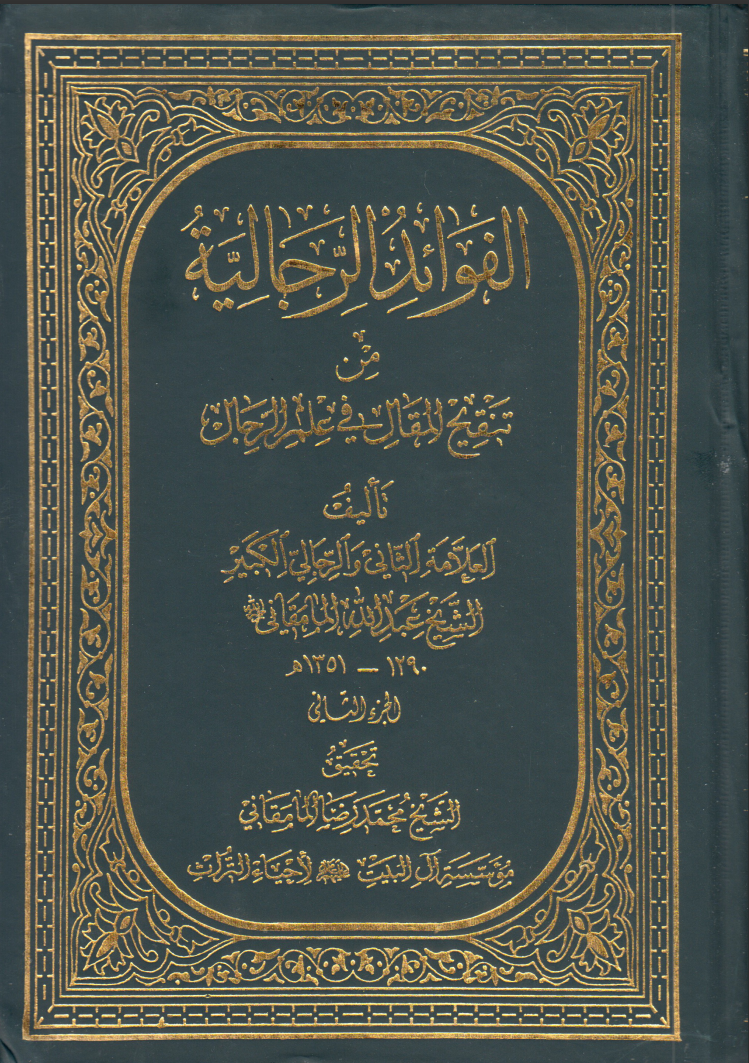
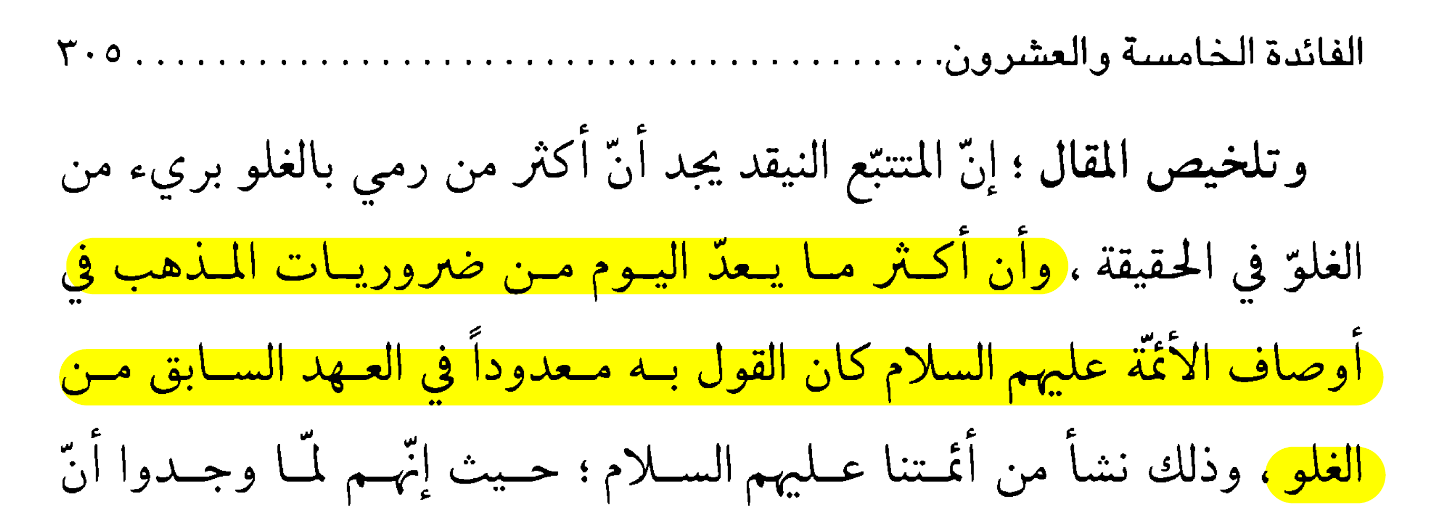
Majority of Current Twelver Imāmī Beliefs about Imams (as) are Ghuluww by Classical Shia Standards
In his entry on the narrator Aḥmad bin ʿAlī al-Rāzī, Shaykh al-Māmaqānī even goes as far as admitting that:
بل أكثر ما نعتقده الآن في أهل البيت عليهم السلام كانوا يومئذ يسمّونه غلوّا
“In fact most of what we believe now about the Ahlul Bayt (as), the Qudamāʾ (early and classical Shīʿa Imāmī scholars) used to call it Ghuluww (deviant, ideological extremism) in their time.”3
Shaykh al-Māmaqānī
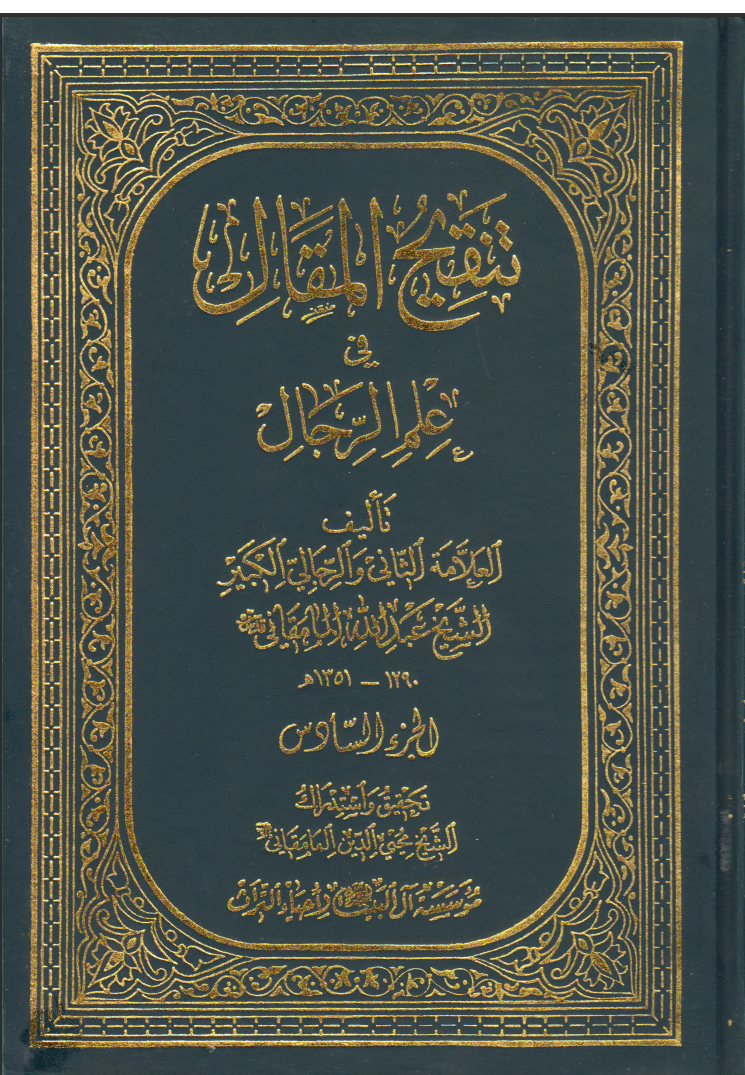
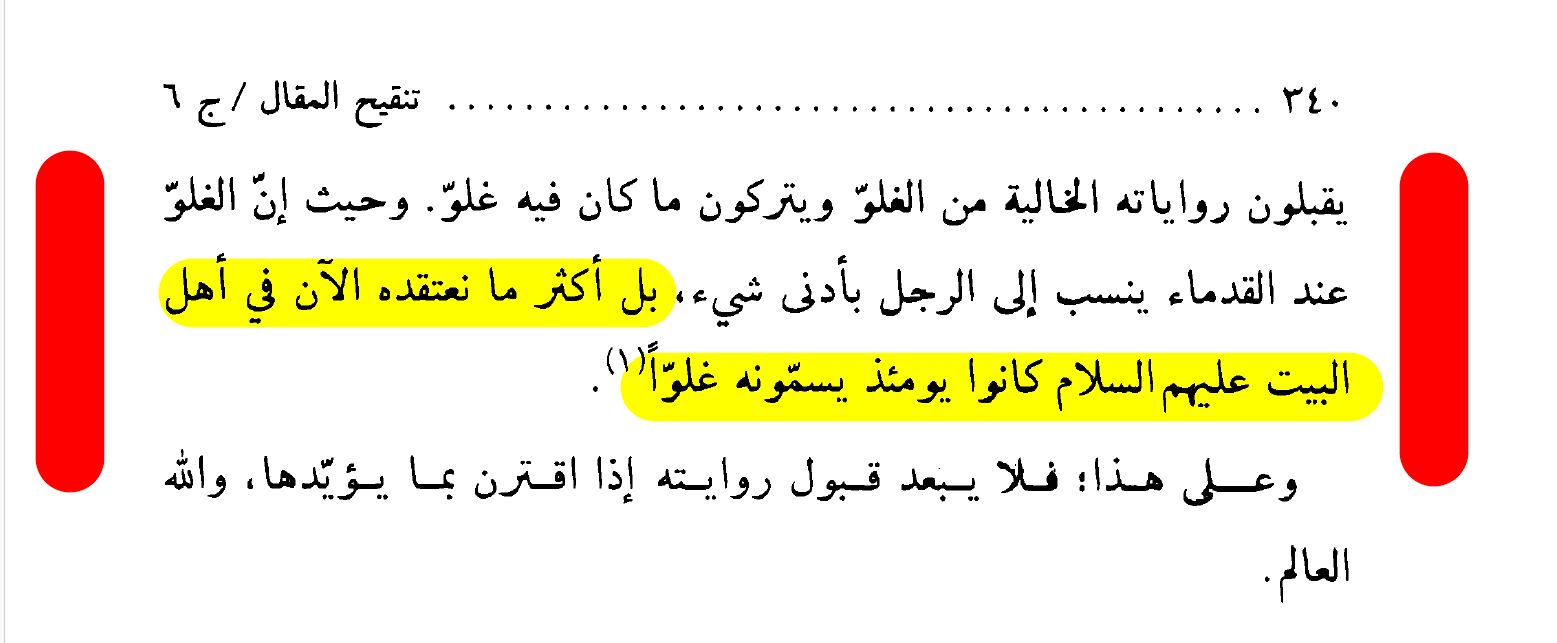
Shaykh al-Māmaqānī is not alone in admitting this. Twelver Imāmī Rijālī authorities in general acknowledge that it is very clear that the early and classical scholars of their sect significantly differed with current-day Twelver scholars in creedal and belief related matters to such a vast extent that they would consider the beliefs of today’s Twelver Imāmī Shīʿa scholars as corrupt, entailing Kufr (disbelief in Islam and heresy), and Ghuluww (ideological extremism and deviation from the path of moderation). In his Rijālī discussions of this reality, the grand Twelver Imāmī jurist and Rijālī authority ʿAllāmah Sayyid ʿAlī al-Burūjerdī (d. 1313 AH) sums up as follows:
وبالجملة الظاهر أن القدماء كانوا مختلفين في المسائل الأصولية، فربما كان
شئ عند بعضهم فاسدا أو كفرا أو غلوا، وعند آخرين عدمه بل مما يجب الاعتقاد
به، فينبغي التأمل في جرحهم بأمثال الأمور المذكورة
“In summation, it is clearly manifest that the Qudamāʾ (early and classical Shīʿa Imāmī scholars) held differing beliefs in creedal matters, so it could be that something was considered to be Fāsid (invalid and corrupt), or Kufr (disbelief) or Ghuluww (deviant and extreme exaggeration) according to some of them, while according to others, it would not be so; in fact it would be regarded as something obligatory to believe in (by these others). Therefore it is appropriate to reflect over their Jarḥ (discrediting and weakening of Ḥadīth narrators) due to the issues such as the aforementioned ones.”4
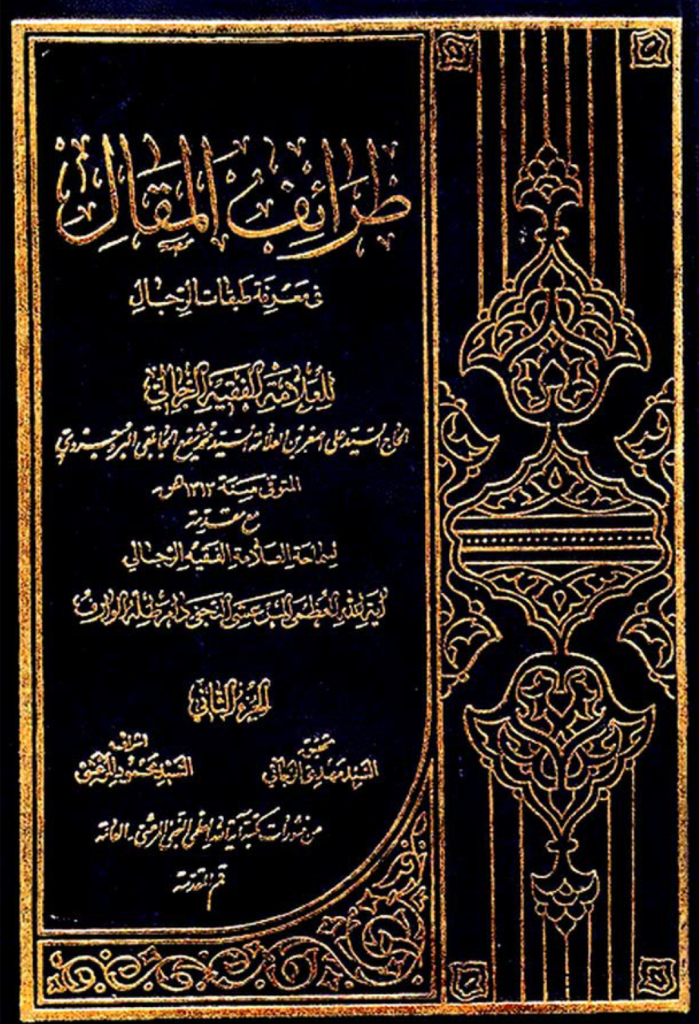
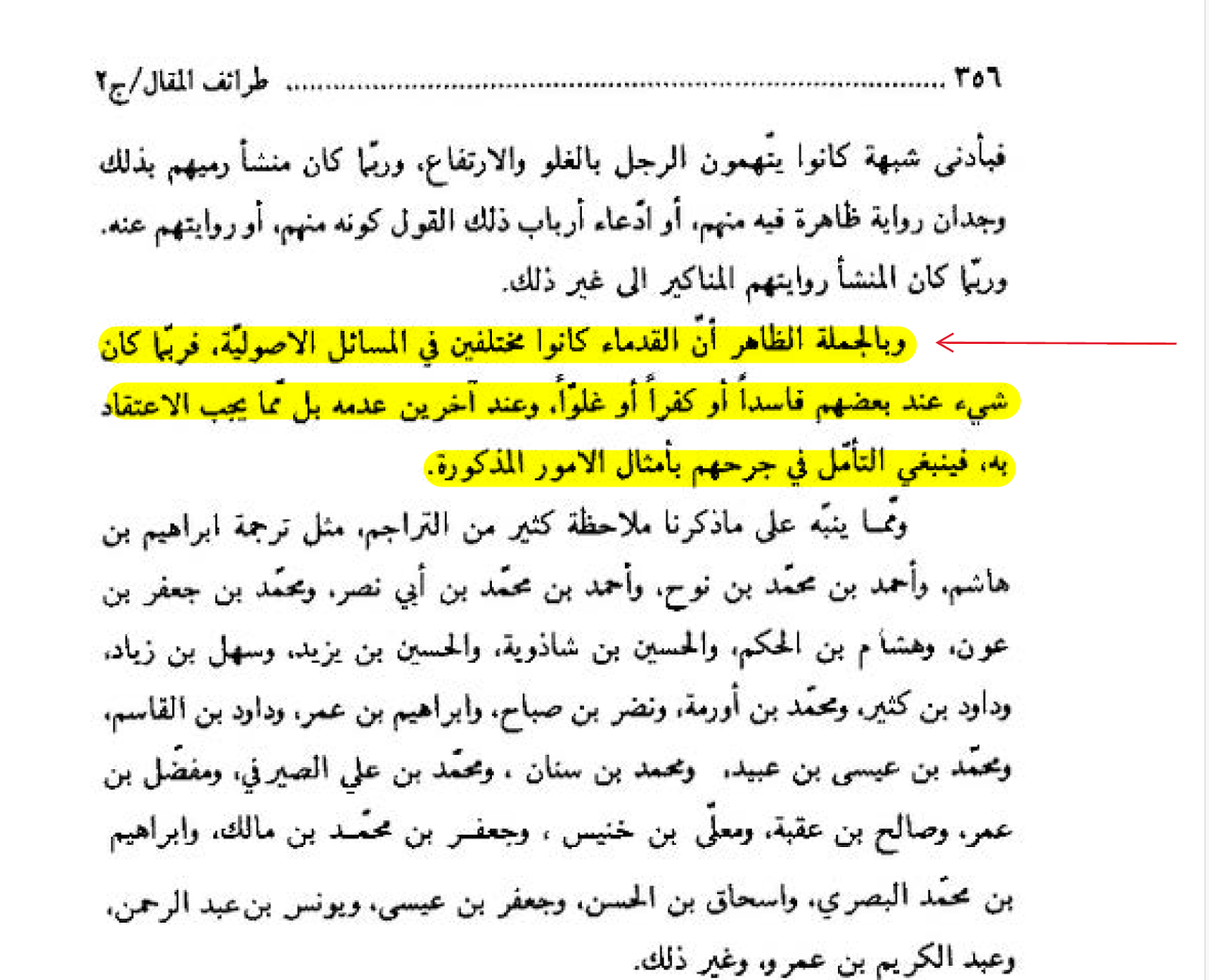
He is also not alone in this observation. When we peruse through other works of Rijāl by contemporary Twelver Imāmī Shīʿa scholars, we find similarly frank admissions. For instance, the famous contemporary Twelver Imāmī Shīʿa scholar, Ayatullah Shaykh Jaʿfar al-Subḥānī, also casually admits this fact, and, in fact, seeks to argue on its basis for the authentication of narrators who were discredited by past scholars of Rijāl for Ghuluww. When discussing the narrator, ʿAbdullāh bin Qāsim al-Ḥaḍramī, and after admitting that the foremost and pre-eminent classical Twelver Imāmī Rijālī authority, al-Najāshī (d. 450 AH?), has discredited this narrator for his deviant belief and his overall weakness and unreliability, he writes:
عندئذ يقوى أن يكون ضعفه لأجل غلوه في العقيدة لا لضعفه في لسانه، وقد عرفت أن التضعيف بين القدماء لأجل العقيدة لا يوجب سلب الوثوق عن الراوي، لأن أكثر ما رآهُ القدماء غلواً أصبح في زماننا من الضروريات في دين الامامية فلاحظ
“It then becomes a strong likelihood that his weakness is due to his Ghuluww (extremism) in ʿAqīdah (belief system and creed), and not because of his unreliability in his tongue, and you have known by now that the Taḍʿīf (discrediting/weakening of a narrator) among the Qudamāʾ (Classical Imāmī Shīʿa scholars) due to ʿAqīdah (belief) does not necessitate the loss of confidence in a narrator (in our eyes), because most of what the Qudamāʾ (Classical Imāmī Shīʿa scholars) saw as Ghuluww (extremism in belief) has become among the Ḍarūriyyāt (core, essential, non-negotiable, foundational beliefs) of the Dīn (Religion) of the Imāmiyyah in our time, so take note of that.”5
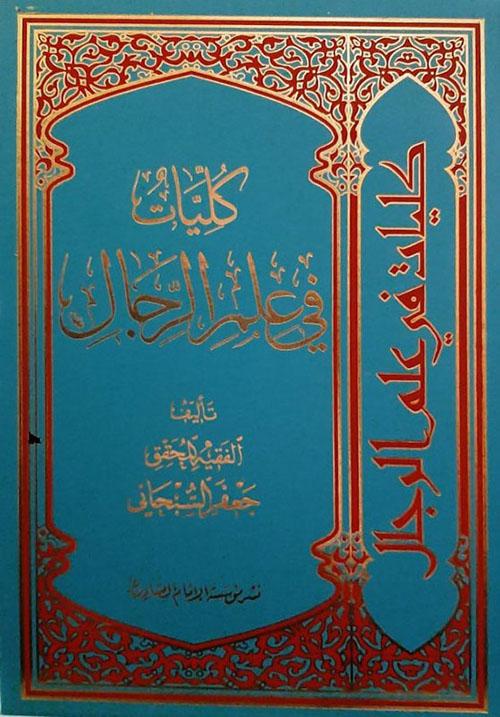
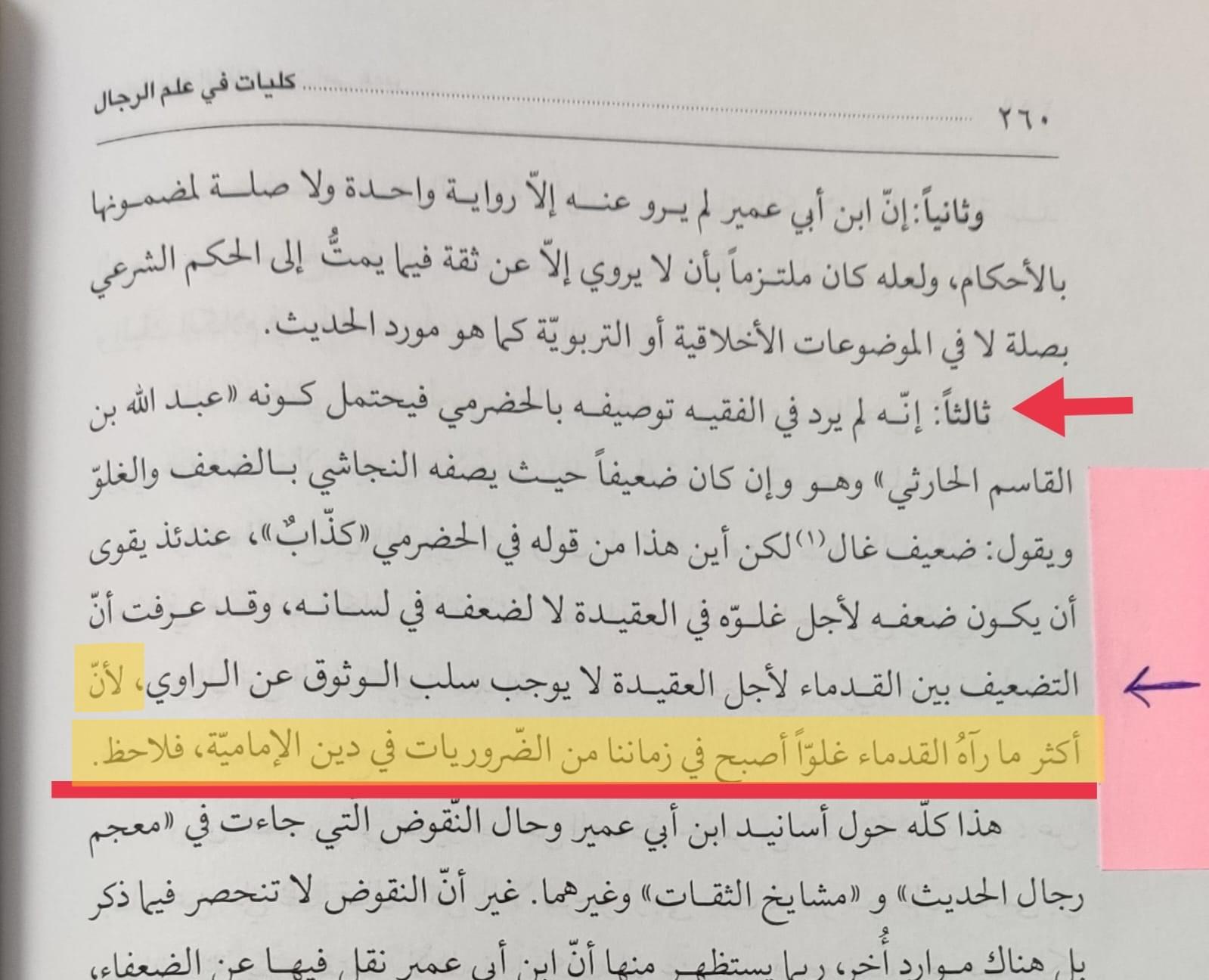
…because most of what the Qudamāʾ (Classical Imāmī Shīʿa scholars) saw as Ghuluww (extremism in belief) has become among the Ḍarūriyyāt (core, essential, non-negotiable, foundational beliefs) of the Dīn (Religion) of the Imāmiyyah in our time…
Ayatullah Shaykh Jaʿfar al-Subḥānī
From this, it emerges that the current-day popular beliefs of the Twelver Imāmīs, especially with regard to the beliefs about the Imams (as), represent not only a clear departure and deviation away from the original teachings of Islam, but also a huge drift away from what classical Imāmī scholarship believed to be the correct path. Thus, the beliefs (and Imamology) of today’s mainstream Twelver Imāmī Shīʿas are not even in harmony with those of their own earlier, classical, sectarian scholarship, let alone the Dīn (religion) of the time of the Prophet (s) and Imam ʿAlī (as) as we can see from the candid admission of the highest-ranking authorities and scholarship of the sect.
Practical and Popular Examples of Ghuluww in current-day Twelver Shīʿa Belief
Throughout the course of his writings, Shaykh al-Māmaqānī actually gives practical examples of beliefs or claims which were considered Ghuluww by the earliest Imāmī Shīʿa scholars, but which have become extremely popular and mainstream Imāmī belief today, and are therefore no longer considered to be deviant or extreme by the majority within the sect.
For instance, when evaluating the narrator Isḥāq bin Muḥammad al-Baṣrī, who has been accused of Ghuluww (ideological extremism and deviation) by the classical Imāmī scholars of Rijāl, al-Māmaqānī quotes an earlier, pre-modern, Rijālī authority, ʿAllāmah al-Waḥīd al-Bihbahānī (d. 1205 AH/1791 CE), who tried to explain why this narrator could have been accused of Ghuluww and consequently discredited, as follows:
ولعلّ طعنهم عليه بسبب اعتقاده بالمفضّل، وروايته الحديث في جلالة المفضّل، واعتنائه بما ورد عنه في التفويض، مثل أنّ الأئمّة عليهم السلام يقدّرون أرزاق العباد، كما سيظهر في المفضّل، ومثل هذا في أمثال زماننا لا يعدّونه من الغلوّ. والظاهر أنّ كثيرا من القدماء كانوا يعدّون هذا- وأدون منه – من الغلوّ، مثل نفي السهو عنهم عليهم السلام
“And perhaps their discrediting him (i.e. Isḥāq bin Muḥammad al-Baṣrī) is due to his belief in (and favourable view on) al-Mufaḍḍal (bin ʿUmar al-Juʿfī)6, and his transmitting narrations extolling the greatness of al-Mufaḍḍal, and his devoting himself to narrating what has come from him on Tafwīḍ7, such as narrations promoting the belief that the Imams (as) allot the Arzāq (pl. of Rizq: sustenance) of the slaves of Allah, as will become clear in our discussion of al-Mufaḍḍal, but this kind of belief in our current-day/contemporary times is not considered as Ghuluww (extremism and deviation from moderation in belief). It is evident that many of the Qudamāʾ (earliest Imāmī companions and scholars) considered this belief (i.e. Tafwīḍ and belief that Imams are in-charge of Rizq by Allah’s permission) to be Ghuluww, and included in it even less extreme beliefs such as denying Sahw (capacity to err due to forgetfulness) for them (i.e. the Prophet (s) and the Imams (as)).”8
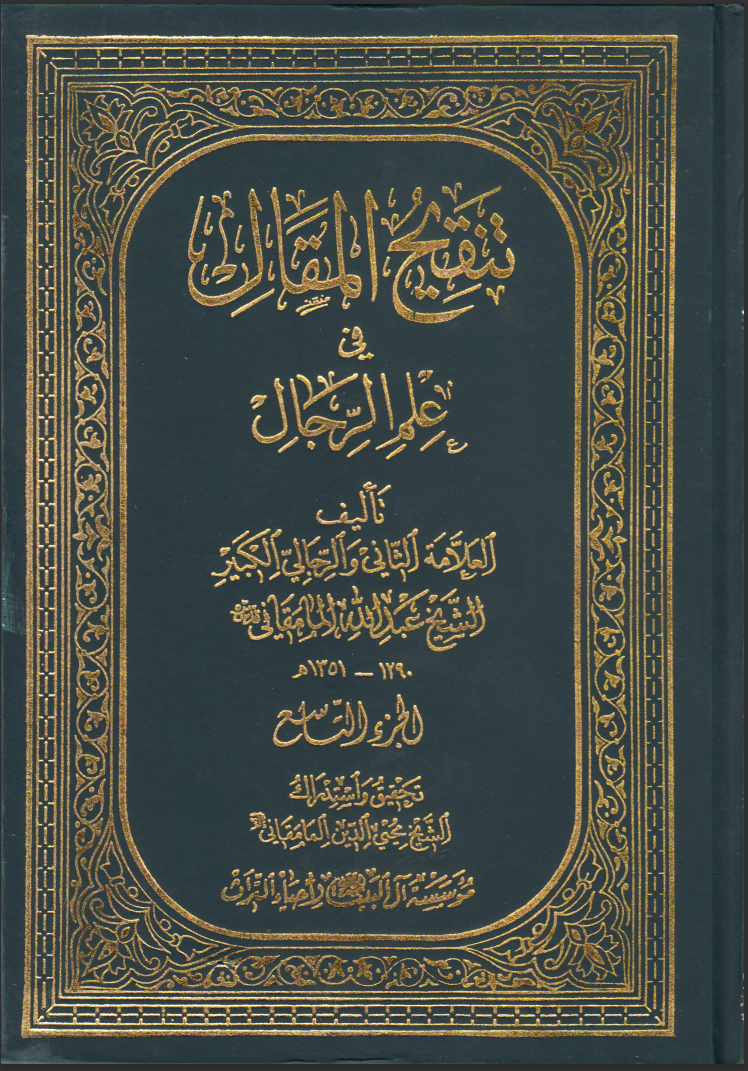
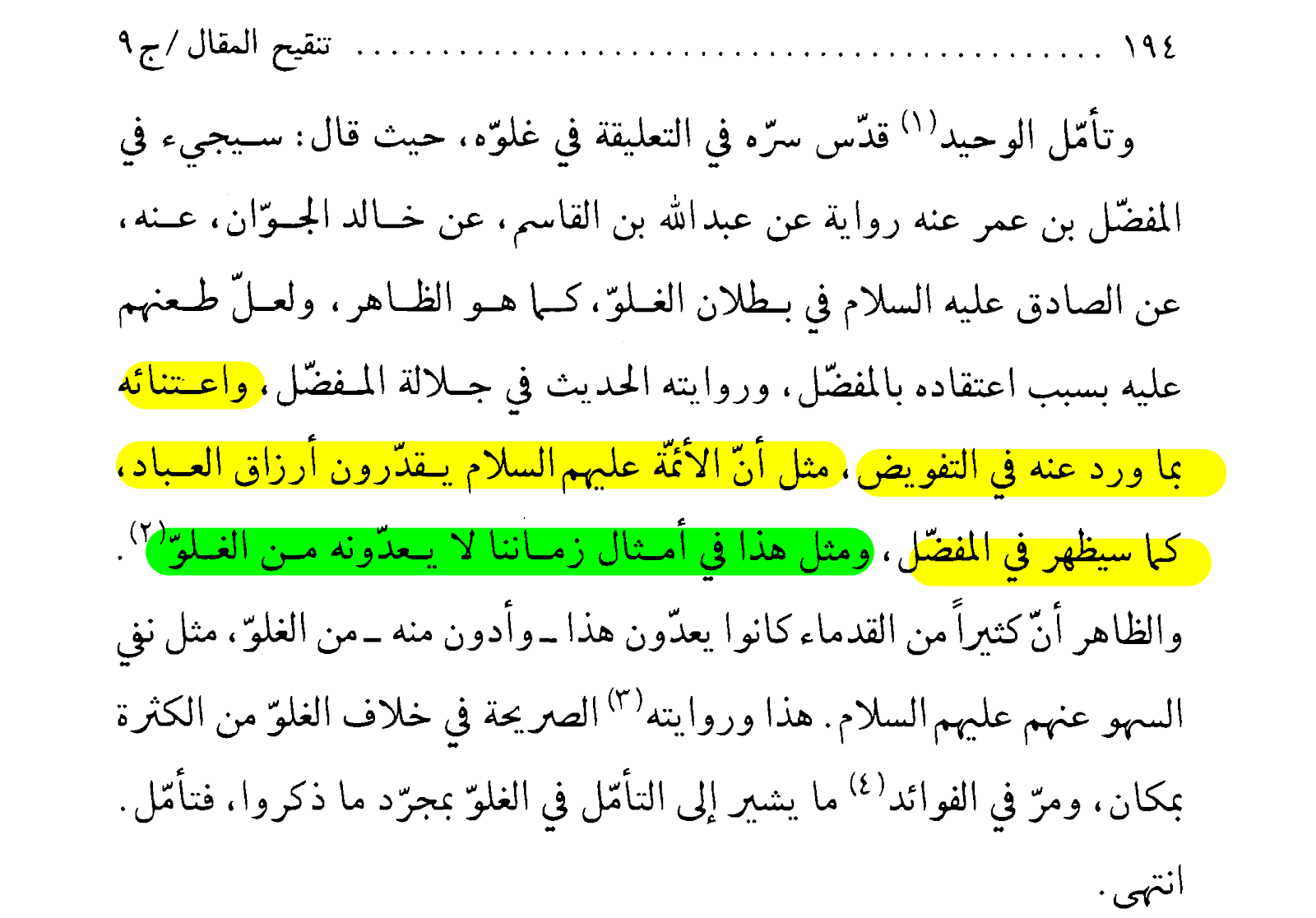
From the aforementioned passage, we can see very clearly how even the grand Twelver Imāmī Uṣūlī scholar, al-Waḥīd al-Bihbahānī, casually admits that belief in the doctrine of Tafwīḍ and the claims that come under it such as the claim that Imams (as) are in-charge of providing sustenance to Allah’s creations due to Allah having specially delegated this responsibility to them has become common popular belief today. It has gained much acceptance, and is not even frowned upon or condemned as Ghuluww by the scholarly establishment anymore, yet in the past, and closer to the times of the Imams (as), this belief and all its attending and accompanying claims were seen as Ghuluww (extremism and deviation in belief) by the classical Shīʿa Imāmī scholars, and for good reason, for they had received superabundant narrations from the Imams of Ahlul Bayt (as) condemning this belief as Shirk, and invoking curses of Allah on its proponents.
Imams (as) Against Ghuluww
The vehement repudiations and strict condemnations of the Imams (as) against such Ghuluww-based beliefs have survived in Imāmī books to this very day.
عَنْ عَبْدِ اللَّهِ بْنِ مُسْكَانَ، قَالَ:، دَخَلَ حُجْرُ بْنُ زَائِدَةَ وَ عَامِرُ بْنُ جُذَاعَةَ الْأَزْدِيُّ عَلَى أَبِي عَبْدِ اللَّهِ (ع) فَقَالا جعلنَا فِدَاكَ، إِنَّ الْمُفَضَّلَ بْنَ عُمَرَ يَقُولُ إِنَّكُمْ تَقْدِرُونَ أَرْزَاقَ الْعِبَادِ!
فَقَالَ: وَاللَّهِ مَا يَقْدِرُ أَرْزَاقَنَا إِلَّا اللَّهُ. وَلَقَدِ احْتَجْتُ إِلَى طَعَامٍ لِعِيَالِي فَضَاقَ صَدْرِي وَأَبْلَغْتُ إِلَى الْفِكْرَةِ فِي ذَلِكَ حَتَّى أَحْرَزْتُ قُوتَهُمْ، فَعِنْدَهَا طَابَتْ نَفْسِي. لَعَنَهُ اللَّهُ وَ بَرِئَ مِنْهُ. قَالا أَفَتَلْعَنُهُ وَ تَتَبَرَّأُ مِنْهُ؟ قَالَ نَعَمْ فَالْعَنَاهُ وَابْرَءَا مِنْهُ بَرِئَ اللَّهُ وَ رَسُولُهُ مِنْهُ
ʿAbdullāh bin Muskān reports: Ḥujr bin Zāʾidah and ʿĀmir bin Judhāʿah al-Azdī entered into the presence of (Imam) Abū Abdillāh (Jaʿfar al-Ṣādiq) (as) and said: May we be your ransom, indeed al-Mufaḍḍal bin ʿUmar says that you are the ones who allot/apportion the Rizq (sustenance) of the slaves.
The Imam (as) replied: By Allah – None allots/apportions our Arzāq (pl. Rizq, sustenance) except Allah. I was in need of food for my family once, so my chest was constrained (i.e. I became deeply worried due to this), and I thought long and hard for what I would do to procure it, until I finally managed to obtain it for them (after exerting myself and seeking it by effort), and then only did I become content and pleased. May Allah Send Laʿnah on him (i.e. distance al-Mufaḍḍal from His Mercy for making such a false claim), and disassociate from him. At this, they (i.e. Ḥujr bin Zāʾidah and ʿĀmir bin Judhāʿah al-Azdī) both said to him: Do you curse him and disassociate from him? The Imam (as) said: Yes, so you two also curse him and disassociate from him, may Allah and His Messenger disassociate from him!9
By Allah – None allots/apportions our Arzāq (pl. Rizq, sustenance) except Allah.
Imam Jaʿfar al-Ṣādiq (as)
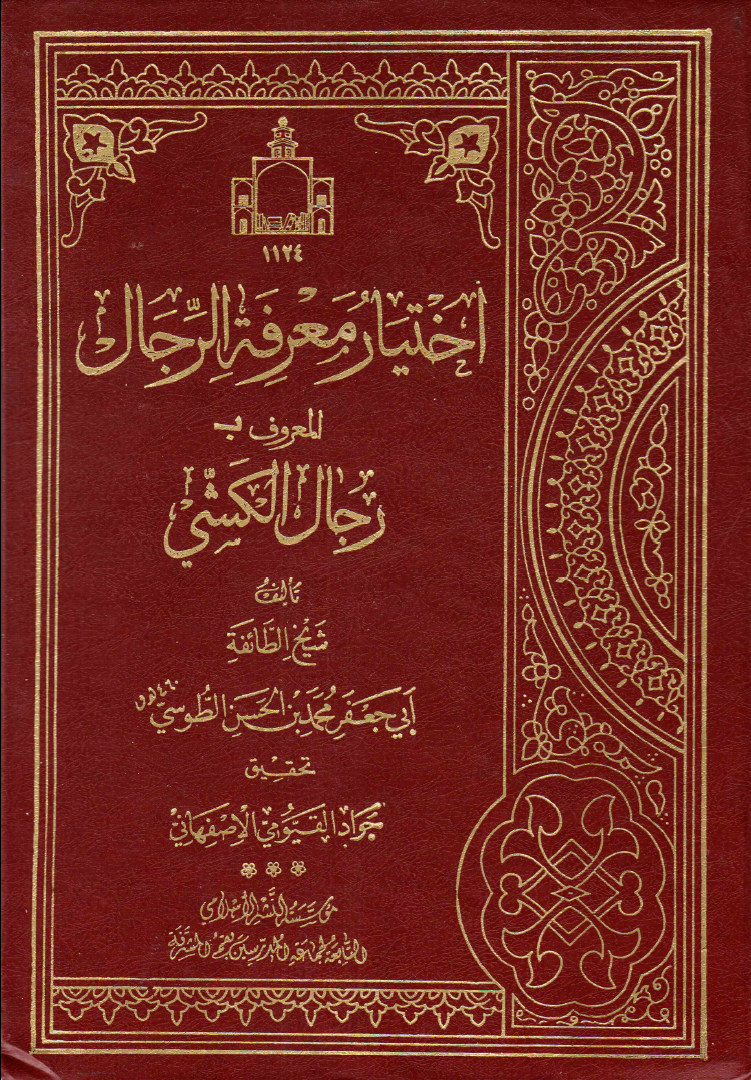
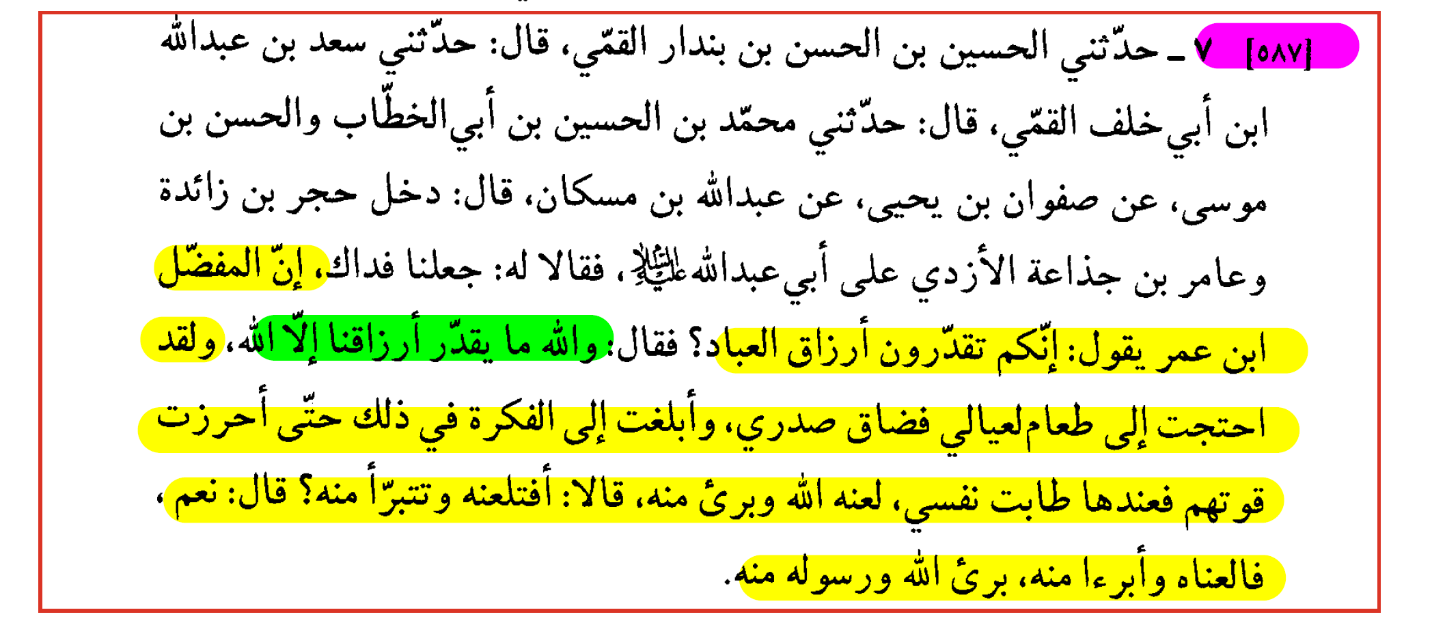
حَدَّثَنِي الْحُسَيْنُ بْنُ الْحَسَنِ بْنِ بُنْدَارَ الْقُمِّيُّ، قَالَ حَدَّثَنِي سَعْدُ بْنُ عَبْدِ اللَّهِ بْنِ أَبِي خَلَفٍ، قَالَ حَدَّثَنَا أَحْمَدُ بْنُ مُحَمَّدِ بْنِ عِيسَى، عَنْ يَعْقُوبَ بْنِ يَزِيدَ وَمُحَمَّدُ بْنُ عِيسَى بْنِ عُبَيْدٍ، عَنْ مُحَمَّدِ بْنِ أَبِي عُمَيْرٍ، قَالَ حَدَّثَنَا بَعْضُ أَصْحَابِنَا، قَالَ: قُلْتُ لِأَبِي عَبْدِ اللَّهِ (ع) زَعَمَ أَبُو هَارُونَ الْمَكْفُوفُ أَنَّكَ قُلْتَ لَهُ إِنْ كُنْتَ تُرِيدُ الْقَدِيمَ فَذَاكَ لَا يُدْرِكُهُ أَحَدٌ، وَإِنْ كُنْتَ تُرِيدُ الَّذِي خَلَقَ وَرَزَقَ فَذَاكَ مُحَمَّدُ بْنُ عَلِيّ!
فَقَالَ كَذَبَ عَلَيَّ عَلَيْهِ لَعْنَةُ اللَّهِ. وَاللَّهِ مَا مِنْ خَالِقٍ إِلَّا اللَّهُ وَحْدَهُ لَا شَرِيكَ لَهُ. حَقٌّ عَلَى اللَّهِ أَنْ يُذِيقَنَا الْمَوْتَ وَالَّذِي لَا يَهْلِكُ هُوَ اللَّهُ خَالِقُ الْخَلْقِ بَارِئُ الْبَرِيَّةِ.
Al-Ḥusain bin al-Ḥasan bin Bundār al-Qummī, narrated to me; he said: Saʿd bin ʿAbdillāh bin Abī Khalaf narrated to me; he said: Aḥmad bin Muḥammad bin ʿĪsā narrated to us, from Yaʿqūb bin Yazīd and Muḥammad bin ʿĪsā ibn ʿUbayd, from Muḥammad bin Abī ʿUmayr; he said: Some of our companions narrated to us, saying, ‘I said to Abū ʿAbdillāh (Jaʿfar al-Ṣādiq) (as): Abū Hārūn al-Makfūf claims that you said to him: ‘If you want Al-Qadīm (the Eternal One), then no one can grasp Him, but if you want the one who creates and gives out sustenance then he is Muḥammad bin ʿAlī (al-Bāqir) (as).’
The Imam (as) replied: ‘He has lied upon me, may Allah curse him! By Allah there is no creator except for Allah, Alone, without any partner. It is Allah’s right over us to make us taste death, and the one who does not perish is Allah, the creator of the creations, and the Originator of all creation.’10

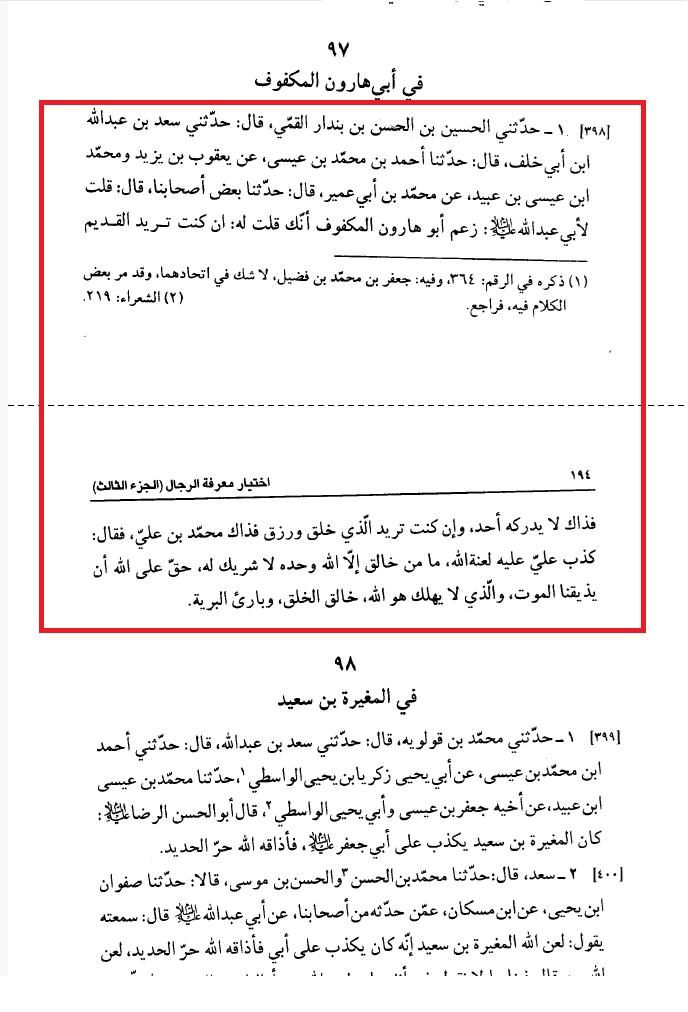
But sadly today, this belief has become so widespread and gained such acceptability that people can get away with promoting it right in front of scholars and community members because what was considered Ghuluww, deviation, blasphemy, and extreme deviation in the past by the Imams (as) and their earliest companions, as well as early classical Imāmī scholars, has today become popular and acceptable.
Reality Check: Open Celebration and Notorious Promotion of Ghuluww by Poets in Twelver Imāmī Gatherings
Not too far back, a grand event was organised in Dar-es-Salaam by the Islamic Youth Service under the theme ‘The Heart of hope’. The city of Dar-es-Salaam boasts the largest congregation of Twelver Imāmī Shīʿas in East Africa, mostly of Khoja heritage. The event was attended by prominent resident scholars, Ahlul Mimbar (speakers who occupy the pulpit), community members, and youths. Various speakers and poets were invited to it. A Poet came up on stage and addressed the audience saying in Urdu:
‘Aapne kehna hain….Jiska yeh Iman hain zara pehle mujhe haath uthaa kar batao….ke kis kis ka yeh iman hain ki use Rizq, Zindagi, Daulat, Shuhrat, Husain Maula ne di hain! Jis Jis ka yeh Iman hain, zara who haath uthaa kar batai, jo oopar baithe hain unse bhi guzarish hain who batayen. Jiska yeh Iman hain ki use Zindagi Husain Maula ne di hain, woh haath uthaa kar batayen.’
‘You all have to speak up… Whoever has this Imān (belief/faith), please raise your hand and tell me whose belief it is that they have received Rizq (sustenance), Zindagi (life), Daulat (wealth), and Shuhrat (fame) from Maula Husain! Anyone who holds this belief, kindly raise your hand and share. Those sitting above, I request them to also inform us. Whoever believes that they have received life from Maula Husain, please raise your hand and let us know.’11
Upon this, several hands, including those of many of our dear youths, go up, and there is no protest or correction from the scholars or any community member.
This is a reality-check for all serious, sincere and enlightened members of our community. This is the state of our communities and this is how deep acceptance for Ghuluww has seeped into it. That they are now actively investing so much money and resources to invite poets who openly promote what the Qur’ān, the Ahlul Bayt (as), and the earliest Imāmī companions and scholars, clearly labeled as Ghuluww and warned against, in clear defiance of the advisories of the Imams (as) against this, such as this one from Imam Jaʿfar al-Ṣādiq (as) which specifically warns community elders to be extra-cautious, super vigilant, and overly protective of their youths against the influence of the Ghulāt:
قَالَ الصَّادِقُ (عَلَيْهِ السَّلَامُ): احْذَرُوا عَلَى شَبَابِكُمْ الْغُلَاةَ لَا يُفْسِدُونَهُمْ، فَإِنَّ الْغُلَاةَ شَرُّ خَلْقِ اللَّهِ، يُصَغِّرُونَ عَظَمَةَ اللَّهِ، وَيَدَّعُونَ الرُّبُوبِيَّةَ لِعِبَادِ اللَّهِ. وَاللَّهِ إِنَّ الْغُلَاةَ شَرٌّ مِنَ الْيَهُودِ وَالنَّصارى وَالْمَجُوسَ وَالَّذِينَ أَشْرَكُوا.
“Beware for (and be very cautious, vigilant and protective of your) youths against the Ghulāt; don’t let them corrupt them; for certainly the Ghulāt are the worst of Allah’s creation; they belittle the greatness of Allah, and they claim Rubūbiyyah (Divine Attributes of Sustainership) for the slaves of Allah12. I swear by Allah, the Ghulāt are worse (in deviation) than the Jews, Christians, Majūs, and the polytheists.”13
Imam Jaʿfar al-Ṣādiq (as)
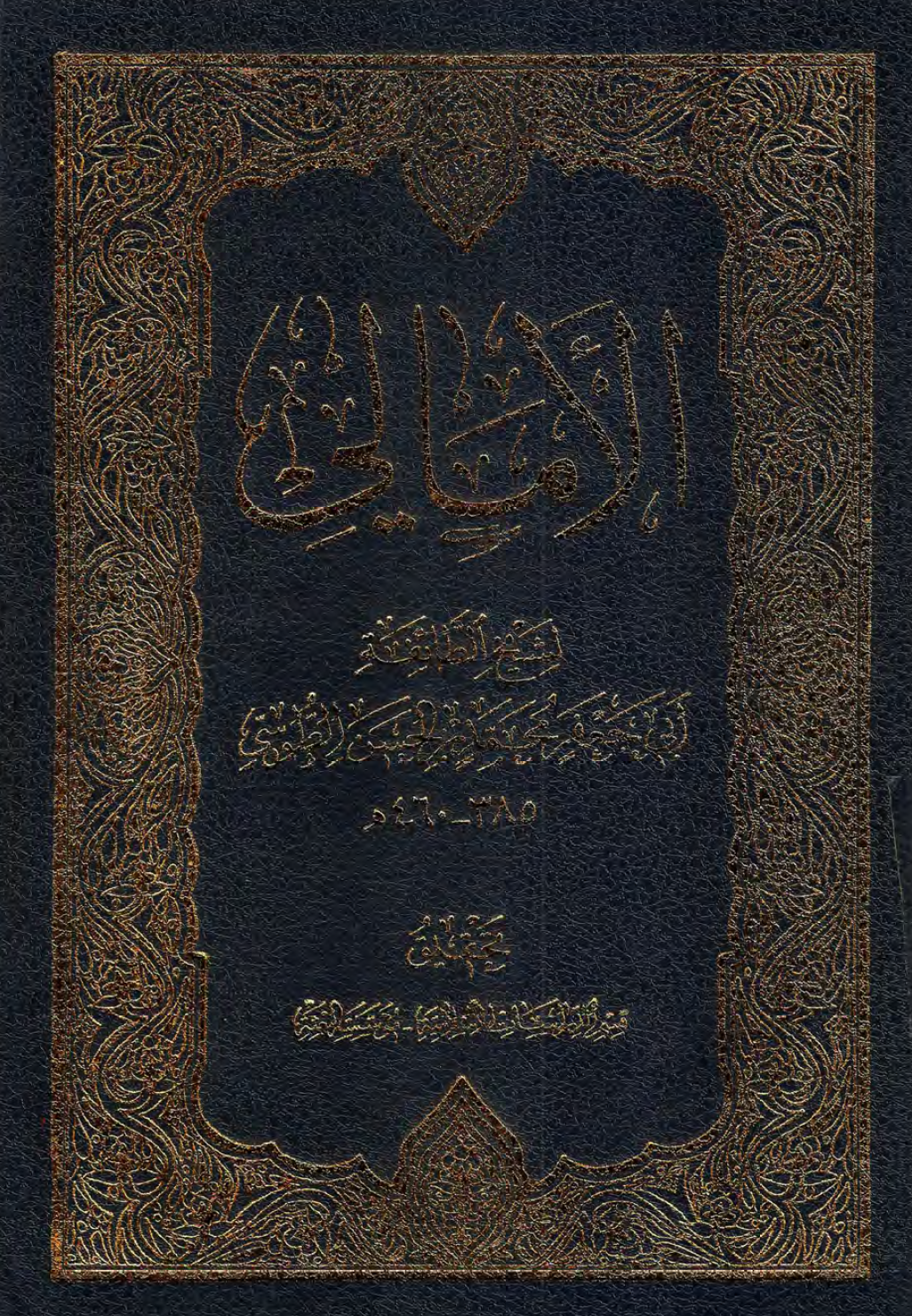
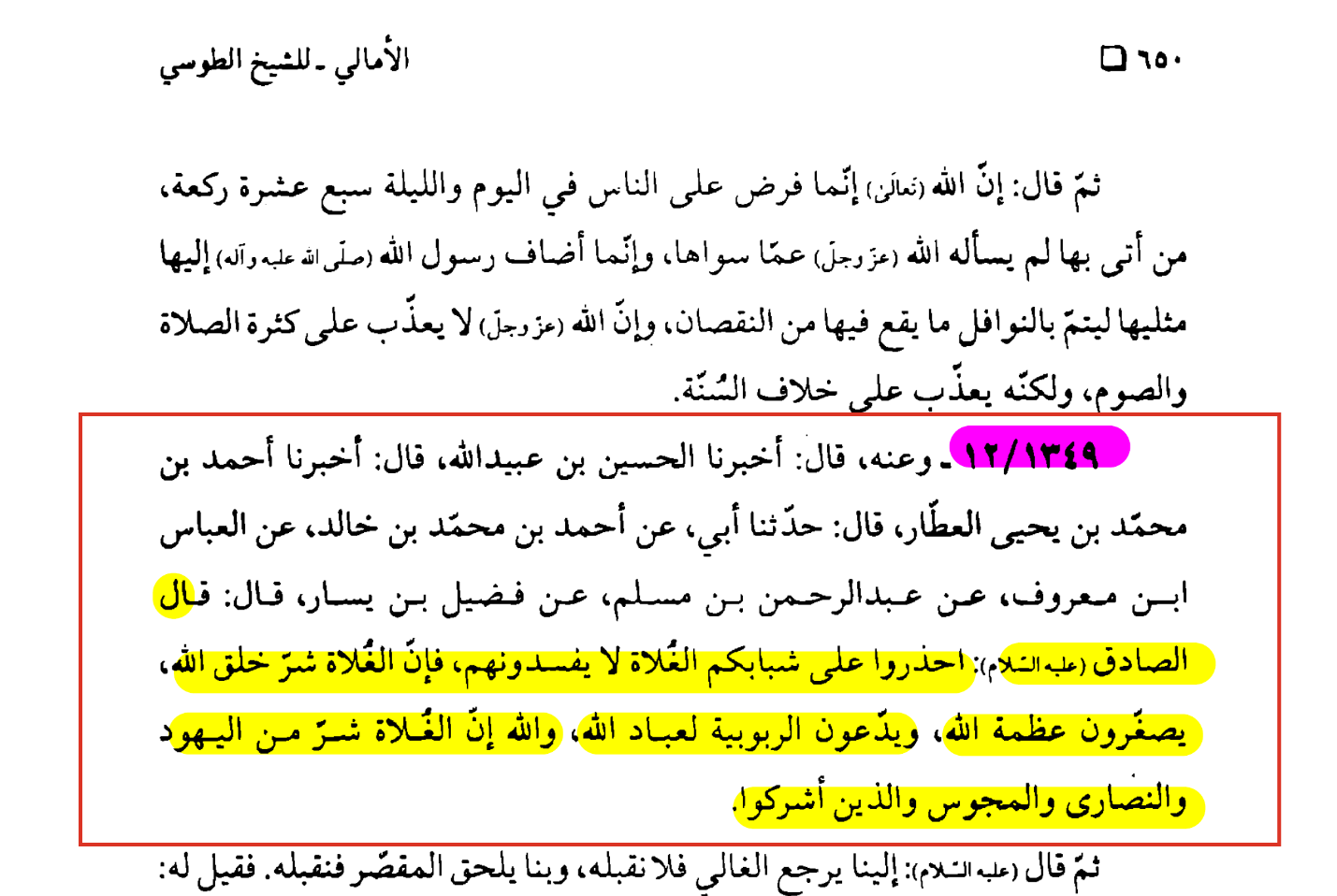
Sadly, Ghuluww has spread like such cancer within the Twelver Imāmī sect that it has even impacted the sectarian scholarly establishment to the point that they have lost the will to fight and combat it in many instances, and in others, they have actually embraced aspects of it, and now defend it with zeal and fervor.
Classical Shīʿa Scholars would consider today’s Twelver Shīʿa Scholars to be Deviant
This fact was pointed out by other scholars of Rijāl as well as we can see from the following statement of Shaykh al-Māmaqānī:
وأقول: قد نبّهنا غير مرّة على أنّ رمي القدماء – سيّما القميين منهم – الرجل بالغلو لا يُعتنى به؛ لأنّ الاعتقاد بجملة ممّا هو الآن من ضروريَّات المذهب كان معدودا عندهم من الغلوّ، ألا ترى عدّهم نفي السهو عن النبيّ صلّى اللّه عليه وآله وسلّم والأئمّة عليهم السلام غلوا، مع أنّ من لم ينف السهو عنهم اليوم لا يُعدّ مؤمنا .ولقد أجاد الفاضل الحائري حيث قال: رمي القميين بالغلو، وإخراجهم من قم لا يدلّ على ضعف أصلا؛ فإنّ أجلّ علمائنا وأوثقهم غال على زعمهم، ولو وجدوه في قم لأخرجوه منها لا محالة.
“I say: We have drawn attention more than once that the Qudamāʾ (classical Imāmī Shīʿa scholars), especially the ones from Qum, accusing a man (Ḥadīth narrator) of Ghluww should not be given any consideration, because believing in what now constitutes the fundamentals of the (Imāmī) Shīʿa Mazhab (sect) these days was considered to be Ghuluww by them (i.e. the classical scholars). Do you not see that they deemed denial of the fact that the Prophet (s) and the Imams (as) can forget as Ghuluww, while today (the situation has been reversed such) that one who does not deny that they (as) may forget would not be considered a Mu’min (believer) these days. Indeed al-Fāḍil al-Ḥāʾirī put it rather brilliantly when he said: “The act of the Qummi scholars of the past accusing (Ḥadīth narrators of being Ghālī) and their expelling them from Qum (on charges of Ghuluww) does not prove any weakness/unreliability (in those discredited or expelled narrators) at all. For indeed, most of our (Shīʿa) scholars today, including the most reputed and trusted ones, would be considered Ghālī (extremist) by them (i.e. by the classical Shīʿa Imāmī scholars of Qum), and if those classical scholars had encountered today’s Shia scholars in Qum, they would have definitely and inevitably expelled them from it without a shadow of doubt.” 14
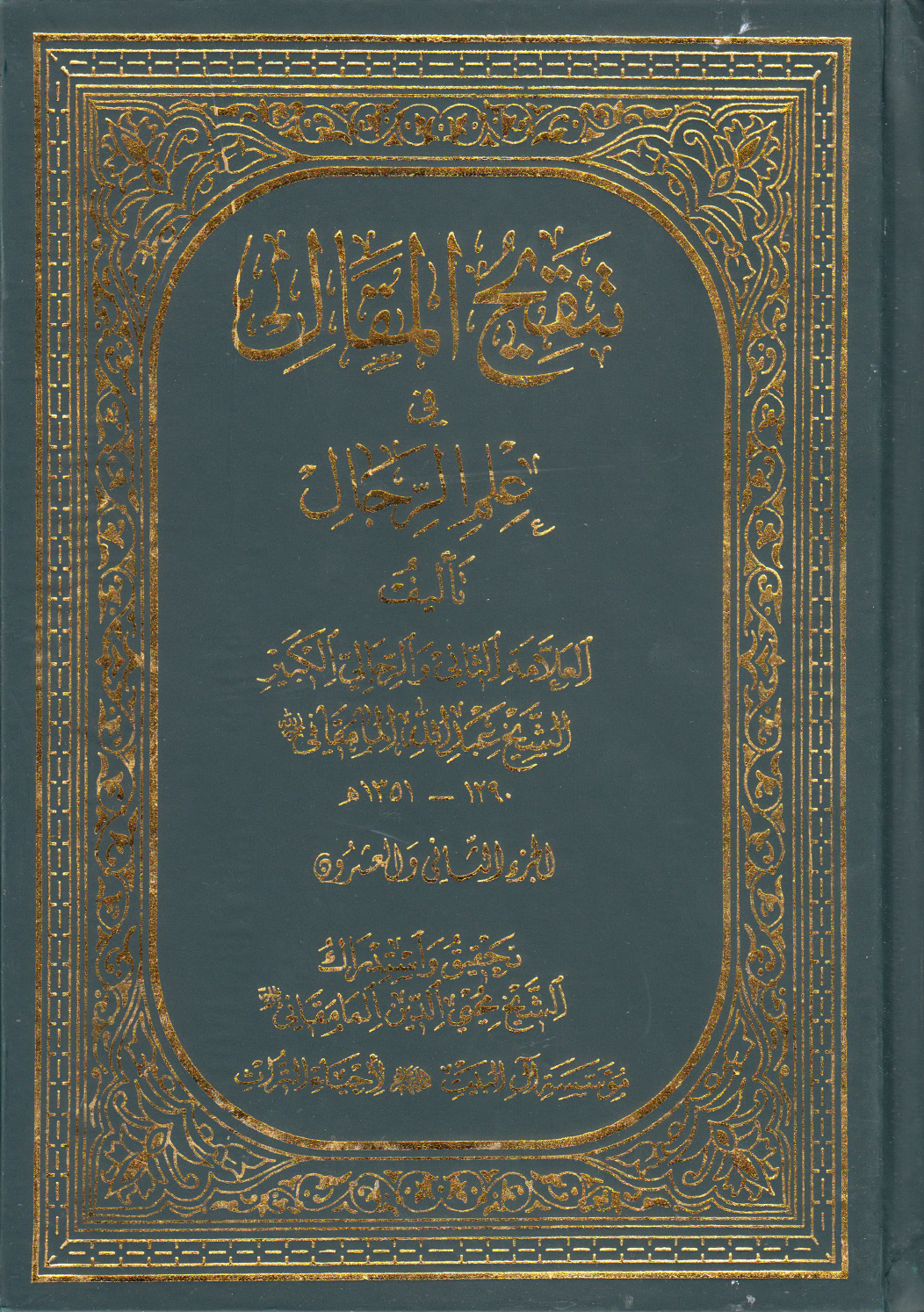
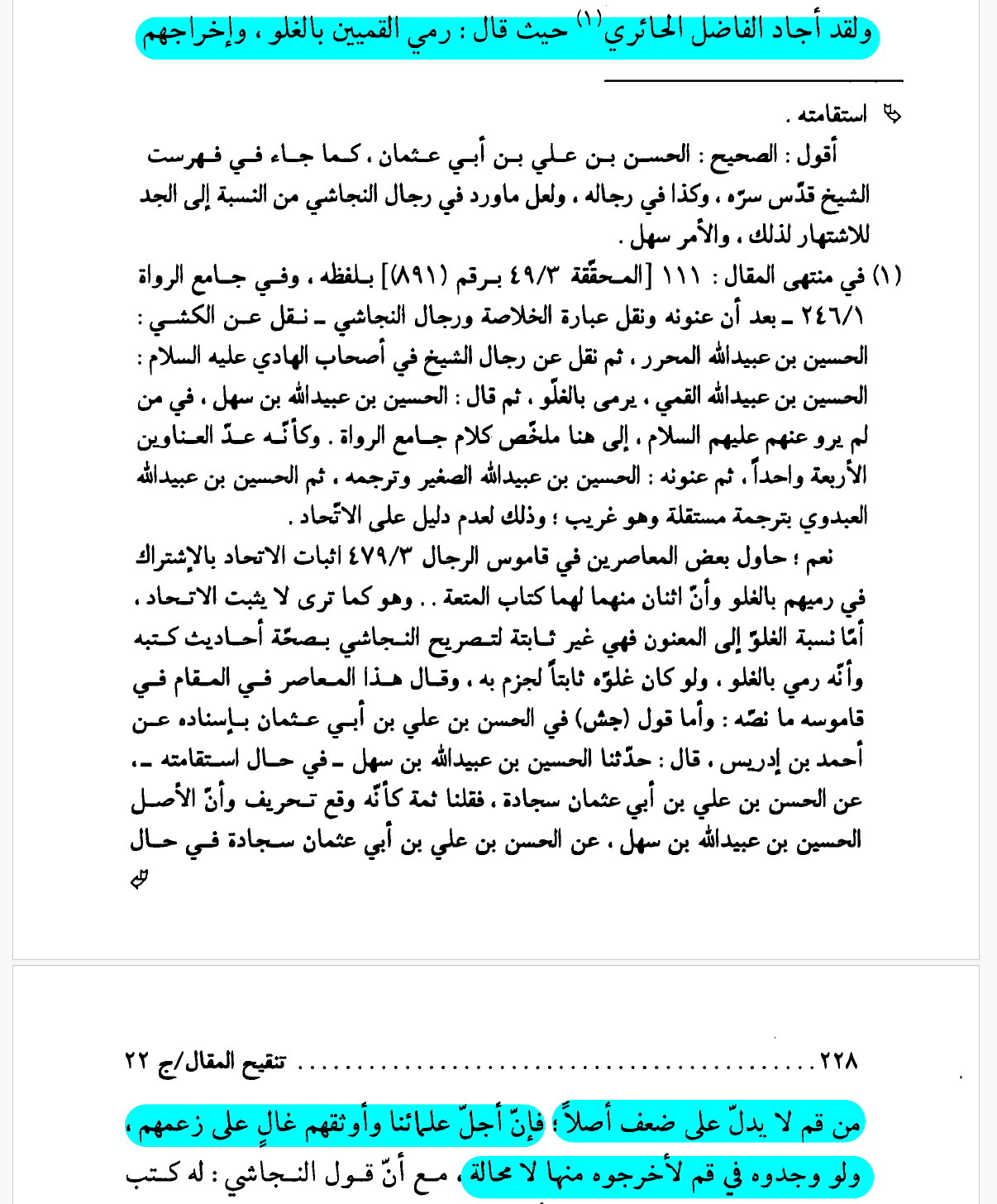
For indeed, most of our (Shīʿa) scholars today, including the most reputed and trusted ones, would be considered Ghālī (extremist) by them (i.e. by the classical Shīʿa Imāmī scholars of Qum), and if those classical scholars had encountered today’s Shia scholars in Qum, they would have definitely and inevitably expelled them from it without a shadow of doubt.
Ayatullah al-Mamaqani quoting from/citing Al-Fadhil al-Hairi
These kinds of candid and frank scholarly testimonies about the state of the sect and its deviation away from its own early and original creed, and its evolution and degeneration into the very extreme that its original founders disassociated from, and considered deviant, should leave the sincere and serious seeker of truth in no doubt about the need for revival, reform, recalibration and course-correction.
How did al-Māmaqānī Remain a traditional Twelver after his damning admission?
Many readers may be tempted to ask: if Shaykh al-Māmaqānī had realised how the vast majority of Twelver Imāmī beliefs about Imams (as) were considered Ghuluww by the classical Imāmī scholarship, then how did he remain a Twelver?
Of course, since this admission is very damning and embarrassing for the current-day sect, al-Māmaqānī offered the following cope. After admitting that the classical Imāmī scholars considered contemporary Imāmī Shīʿa beliefs about Imams (as) to be Ghuluww (extremism), he argued as follows:
وذلك نشأ من أئمتنا عليهم السلام؛ حيث إنّهم لمّا وجدوا أنّ الشيطان دخل مع شيعتهم من هذا السبيل لإضلالهم – وفاء لما حلف به من إغواء عباد اللّه أجمعين – حذّروهم من القول في حقهم بجملة من مراتبهم إبعادا لهم عمّا هو غلوّ حقيقة، فهم منعوا الشيعة من القول بجملة من شؤونهم حفظا لشؤون اللّه جلت عظمته، حيث كان [عندهم] أهمّ من حفظ شؤونهم؛ لأنّه الأصل، وشؤونهم فرع شأنه، نشأت من قربهم لديه ومنزلتهم عنده، وهذا هو الجامع بين الأخبار المثبتة لجملة من الشؤون لهم والنافية لها.
“This (situation whereby the classical Imāmī scholars ended up regarding certain current-day Imāmī beliefs as Ghuluww) actually resulted from the Imams (as); for when they found out that Shayṭān had actually found a way to misguide their followers through this avenue (i.e. attributing Divine powers to them) – in fulfillment of what he (i.e. Shayṭān) swore to do in terms of misguiding all of Allah’s servants, they warned their followers against affirming some of their actual stations so as to distance them from what is actually Ghuluww in reality. They prohibited the Shia from making certain statements about them to safeguard the sanctity of Allah’s Divine Office, which they deemed more crucial than safeguarding their own office and role. This is because the sanctity of Allah’s Office is fundamental, while their own office is secondary to His. This approach reconciles various established reports about their (divine) roles and powers, some of which affirm such roles and powers, and some of which negate them.”15
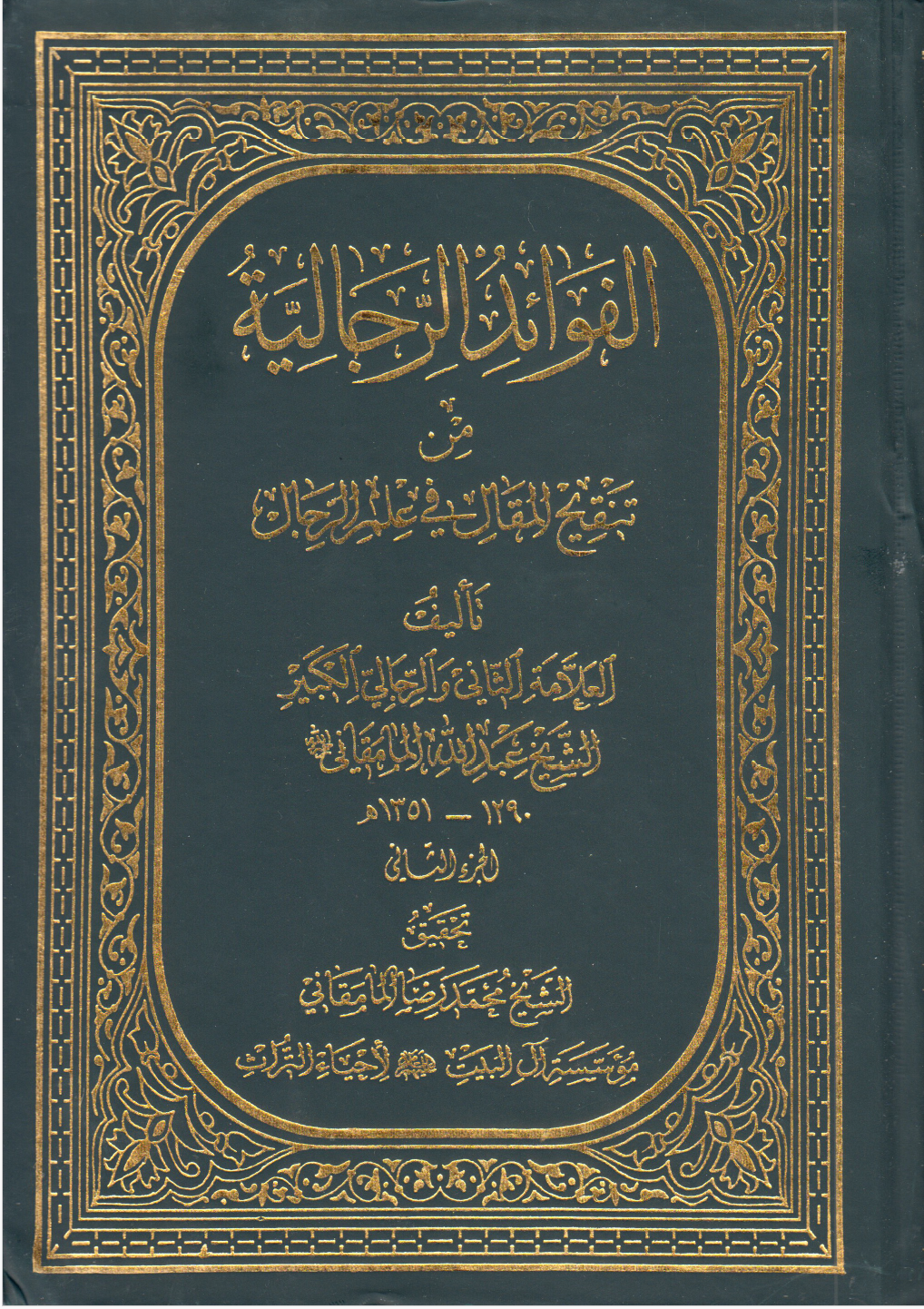
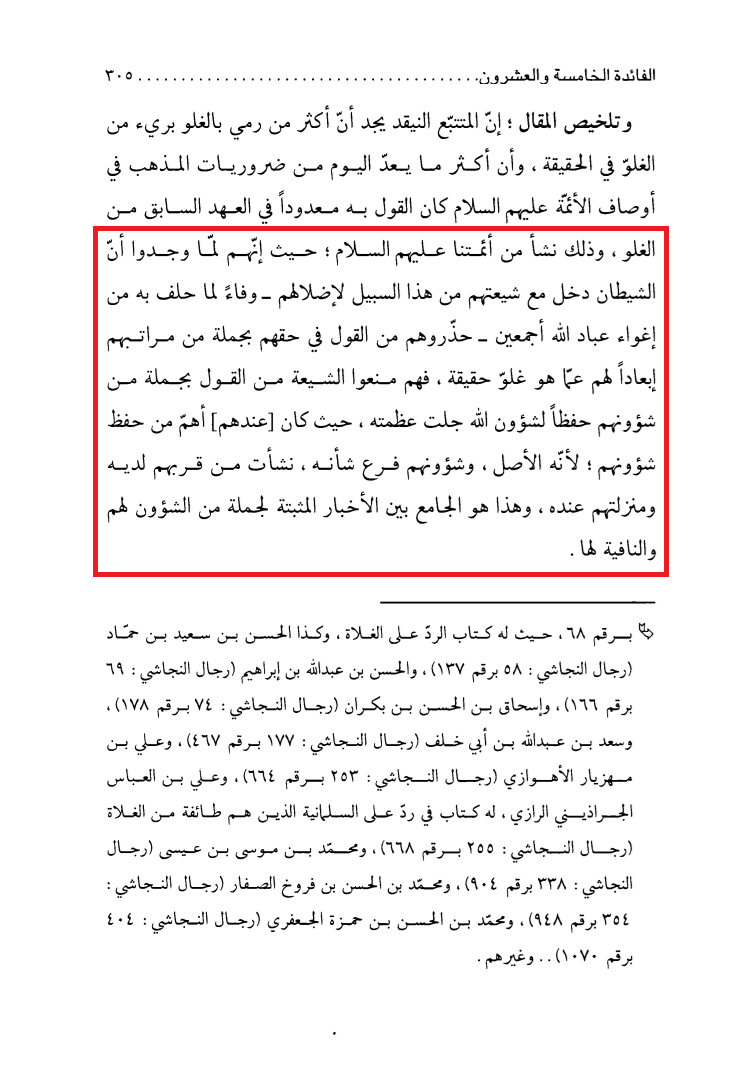
Thus al-Māmaqānī is trying to argue that after they found out about the emergence of extreme trends among their followers, the Imams (as) tried to create a buffer zone to serve as a bulwark against Ghuluww. To do so, they even negated some of their actual, genuine, bonafide stations, roles, powers, and prerogatives as a means to protect people from falling into the actual Ghuluww that lay beyond them.
So he means to say that the narrations in which the Imams (as) are seen negating the attribution of unique Divine powers to them and rejecting such claims about them aren’t actually truthful, because the Imams (as) do actually have those powers, but they merely denied them so as to protect people from falling into extremism!
However, such an argument is manifestly weak and untenable, primarily because it is contradicted by the realities of the Qur’ān. The Qur’ān shows us that Prophets of God and Divine appointees never denied or hid any special, miraculous or extraordinary powers or privileges which Allah (SWT) had, in fact, Bestowed upon them for fear that their followers would start deifying them or setting them up as rivals for God.
In Sūrah al-Naml (Chapter 27) of the Qur’ān, for instance, we see Prophet Sulaymān (as) publicly announcing, recounting, and praising Allah (SWT) before his royal assembly for the amazing and extraordinary powers and capabilities He had bestowed upon him:
وَوَرِثَ سُلَيْمَانُ دَاوُودَ وَقَالَ يَا أَيُّهَا النَّاسُ عُلِّمْنَا مَنْطِقَ الطَّيْرِ وَأُوتِينَا مِنْ كُلِّ شَيْءٍ إِنَّ هَذَا لَهُوَ الْفَضْلُ الْمُبِينُ (27:16)
And Sulaymān inherited Dawūd, and he said: O people! We have been taught the language of birds, and we have been given of all things; most surely this is manifest grace. (27: 16).
So he did not conceal any of the special capabilities he was given by God for fear of being taken as a rival or god besides Him.
Similarly, Prophet ʿĪsā (as) publicly announced the miraculous powers and abilities he was given by God; he never denied them or concealed them from his people for fear that they would deify him or cross the limit in exaggerating his status. Here we see the Qur’ān recounting how he announced and revealed his miraculous powers before the the Banū Isrāīl as he preached to them:
وَرَسُولًا إِلَى بَنِي إِسْرَائِيلَ أَنِّي قَدْ جِئْتُكُمْ بِآَيَةٍ مِنْ رَبِّكُمْ أَنِّي أَخْلُقُ لَكُمْ مِنَ الطِّينِ كَهَيْئَةِ الطَّيْرِ فَأَنْفُخُ فِيهِ فَيَكُونُ طَيْرًا بِإِذْنِ اللَّهِ وَأُبْرِئُ الْأَكْمَهَ وَالْأَبْرَصَ وَأُحْيِي الْمَوْتَى بِإِذْنِ اللَّهِ وَأُنَبِّئُكُمْ بِمَا تَأْكُلُونَ وَمَا تَدَّخِرُونَ فِي بُيُوتِكُمْ إِنَّ فِي ذَلِكَ لَآَيَةً لَكُمْ إِنْ كُنْتُمْ مُؤْمِنِينَ (49)
And a Messenger to the children of Isrāīl: That I have come to you with a sign from your Lord, that I create for you out of dust like the form of a bird, then I breathe into it and it becomes a bird with Allah’s permission, and I heal the blind and the leper, and bring the dead to life with Allah’s permission, and I inform you of what you should eat and what you should store in your houses; most surely there is a sign in this for you, if you are believers. (03: 49)
Even Allah (SWT) in the Qur’ān never followed a policy of denying actual facts or favours and privileges He had bestowed on His Messengers and Prophets out of a fear or concern that people could be misguided by it and start deifying those slaves. Despite being a Witness to how the Christians ended up claiming Prophet ʿĪsā (As) to be a son of god by virtue of the fact that he had no human father, Allah (SWT) confirmed his virgin birth in the Qur’ān and never sought to deny this real miracle just because so many people got misguided by it in the past and still others continue be misguided by it today.
Denying facts or realities or favours or miracles or miraculous powers which God bestows a slave – out of some misplaced fear that they may be misinterpreted or be misused to claim divinity for that slave has never been Divine policy, and there is also no righteous precedent for it in the Qur’ān. Therefore, it is inconceivable that the Imams (as) would actually lie and deny their genuine attributes and powers out of a perceived fear that people would go astray due to learning of them.
In fact, if Allah had really bestowed Divine powers, functions, or supernatural powers upon the Imams (as), they could have easily affirmed these for themselves while firmly reminding their followers that these were just Divine gifts or instances of Divine empowerment, and that they were merely capable of exercising these kinds of powers with Allah’s permission. But the fact that the Imams (as) didn’t seek to issue any such clarification when they were informed of the claims of the Ghulāt about them, and instead sought to distance, disassociate and repudiate such claims straight away without any if’s or buts shows that they didn’t believe in any such empowerment for themselves in the first place.
We are therefore left with no option but to conclude that all the instances in which the Imams (as) are reported to have denied claims of Ghulāt about them, and repudiated the ranks, stations, or Divine powers and functions which they sought to attribute to them…..that in all such instances, the Imams (as) were, in fact, stating the truth, and refuting falsehood, and that therefore, the classical scholars were also right in dismissing the claims of the Ghulāt about them as Ghuluww, and they were correct in discrediting the narrators who invented these claims and specialised in transmitting them.
Solution: How to Detect the Ghuluww in the Sect and Remove it?
Ghuluww, in the context of Imāmī Shīʿaism, is defined by the Imams (as) as ‘claiming anything about the Imams (as) which they do not claim about themselves.’ 16


But how do we know what the Imams (as) said about themselves and what they denied?
The Imāmī Ḥadīth corpus is full of tall, bizarre, strange, exaggerated claims as well as more plausible ones about them, so how does one sift through all that, and determine what the Imams (as) could have said and not said.
The answer is provided by Imam ʿAlī al-Riḍā (d. 203 AH) in a highly authenticated narration17 which also inspires our exceptionally strict and highly skeptical approach to the Imāmī Ḥadīth corpus, and our tossing out every tall claim from it which cannot be externally verified from either the Qur’ān and mass transmitted Sunnah, or narrations which can be independently cross-verified against transmissions from non-Imāmī sources as well, because the Imam (as) practically nukes the entire sectarian corpus except whatever in it can be verified and corroborated by comparison against the Qur’ān, established Sunnah, and other statements of the Ahlul Bayt (as) which are known to be true independently of what the Imāmī corpus claims about them.
حَدَّثَنِي مُحَمَّدُ بْنُ قُولَوَيْهِ وَالْحُسَيْنُ بْنُ الْحَسَنِ بْنِ بُنْدَارَ الْقُمِّيُّ، قَالا حَدَّثَنَا سَعْدُ بْنُ عَبْدِ اللَّهِ، قَالَ حَدَّثَنِي مُحَمَّدُ بْنُ عِيسَى بْنِ عُبَيْدٍ، عَنْ يُونُسَ بْنِ عَبْدِ الرَّحْمَنِ، أَنَّ بَعْضَ أَصْحَابِنَا سَأَلَهُ وَأَنَا حَاضِرٌ، فَقَالَ لَهُ يَا أَبَا مُحَمَّدٍ مَا أَشَدَّكَ فِي الْحَدِيثِ وَأَكْثَرَ إِنْكَارَكَ لِمَا يَرْوِيهِ أَصْحَابُنَا ! فَمَا الَّذِي يَحْمِلُكَ عَلَى رَدِّ الْأَحَادِيثِ؟ فَقَالَ حَدَّثَنِي هِشَامُ بْنُ الْحَكَمِ أَنَّهُ سَمِعَ أَبَا عَبْدِ اللَّهِ (ع) يَقُولُ لَا تَقْبَلُوا عَلَيْنَا حَدِيثاً إِلَّا مَا وَافَقَ الْقُرْآنَ وَالسُّنَّةَ أَوْ تَجِدُونَ مَعَهُ شَاهِداً مِنْ أَحَادِيثِنَا الْمُتَقَدِّمَةِ، فَإِنَّ الْمُغِيرَةَ بْنَ سَعِيدٍ لَعَنَهُ اللَّهُ دَسَّ فِي كُتُبِ أَصْحَابِ أَبِي أَحَادِيثَ لَمْ يُحَدِّثْ بِهَا أَبِي، فَاتَّقُوا اللَّهَ وَلَا تَقْبَلُوا عَلَيْنَا مَا خَالَفَ قَوْلَ رَبِّنَا تَعَالَى وَسُنَّةَ نَبِيِّنَا (ص)، فَإِنَّا إِذَا حَدَّثْنَا قُلْنَا قَالَ اللَّهُ عَزَّ وَجَلَّ وَقَالَ رَسُولُ اللَّهِ (ص).
قَالَ يُونُسُ: وَافَيْتُ الْعِرَاقَ فَوَجَدْتُ بِهَا قِطْعَةً مِنْ أَصْحَابِ أَبِي جَعْفَرٍ (ع)، وَوَجَدْتُ أَصْحَابَ أَبِي عَبْدِ اللَّهِ (ع) مُتَوَافِرِينَ فَسَمِعْتُ مِنْهُمْ وَأَخَذْتُ كُتُبَهُمْ، فَعَرَضْتُهَا مِنْ بَعْدُ عَلَى أَبِي الْحَسَنِ الرِّضَا (ع) فَأَنْكَرَ مِنْهَا أَحَادِيثَ كَثِيرَةً أَنْ يَكُونَ مِنْ أَحَادِيثِ أَبِي عَبْدِ اللَّهِ (ع)، وَقَالَ لِي: إِنَّ أَبَا الْخَطَّابِ كَذَبَ عَلَى أَبِي عَبْدِ اللَّهِ (ع). لَعَنَ اللَّهُ أَبَا الْخَطَّابِ! وَكَذَلِكَ أَصْحَابُ أَبِي الْخَطَّابِ يَدُسُّونَ هَذِهِ الْأَحَادِيثَ إِلَى يَوْمِنَا هَذَا فِي كُتُبِ أَصْحَابِ أَبِي عَبْدِ اللَّهِ (ع)، فَلَا تَقْبَلُوا عَلَيْنَا خِلَافَ الْقُرْآنِ، فَإِنَّا إِنْ تَحَدَّثْنَا حَدَّثْنَا بِمُوَافَقَةِ الْقُرْآنِ وَمُوَافَقَةِ السُّنَّةِ. إِنَّا عَنِ اللَّهِ وَعَنْ رَسُولِهِ نُحَدِّثُ، وَلَا نَقُولُ قَالَ فُلَانٌ وَفُلَانٌ فَيَتَنَاقَضَ كَلَامُنَا. إِنَّ كَلَامَ آخِرِنَا مِثْلُ كَلَامِ أَوَّلِنَا وَكَلَامَ أَوَّلِنَا مُصَادِقٌ لِكَلَامِ آخِرِنَا، فَإِذَا أَتَاكُمْ مَنْ يُحَدِّثُكُمْ بِخِلَافِ ذَلِكَ فَرُدُّوهُ عَلَيْهِ وَقُولُوا أَنْتَ أَعْلَمُ وَمَا جِئْتَ بِهِ! فَإِنَّ مَعَ كُلِّ قَوْلٍ مِنَّا حَقِيقَةً وَعَلَيْهِ نُوراً، فَمَا لَا حَقِيقَةَ مَعَهُ وَلَا نُورَ عَلَيْهِ فَذَلِكَ مِنْ قَوْلِ الشَّيْطَانِ.
Muḥammad bin Qūlawayh and al-Ḥusain bin al-Ḥasan bin Bundār al-Qummī narrated to us; they both said: Saʿd bin ʿAbdillāh narrated to us; he said: Muḥammad bin ʿĪsā bin ʿUbayd narrated to us, from Yūnus bin ʿAbd al-Raḥmān, that some of our companions asked him (i.e. Yūnus) in my presence: O Abā Muḥammad, why are you so strict/severe (i.e. skeptical) in matters of Ḥadīth (narrations), and why do you so frequently reject the narrations of our Aṣḥāb (Imāmī companions)? What drives you to reject (so many of) the Aḥādīth?
He said: Hishām bin al-Ḥakam informed me that he heard Imam Jaʿfar al-Ṣādiq (as) saying: ‘Do not accept any Hadith from us unless it agrees with the Quran and the Sunnah, or you can find support for it from our prior established Aḥādīth, because al-Mughīrah bin Saʿīd (May Allah Curse him) added (fabricated) Aḥādīth to the books of the companions of my father which my father had not narrated. Therefore, fear Allah, and do not accept in our name anything that goes against the Statement of our Lord and the Sunnah of our Prophet (s), because whenever we narrate, we say: Allah Said, and the Messenger of Allah (s) said.’
Yūnus says: I came to Iraq, and found a group of the companions of Imam al-Bāqir (as) over there, and I also found many companions of Imam al-Ṣādiq (as) over there, and they were in good numbers, so I listened (to their narrations) from them, and took their books of Ḥadīth from them, and then after that, I presented them before Imam Abū al-Ḥasan al-Riḍā (as), so he rejected so many of those Aḥādīth, and pointed out that they were not from the Aḥādīth of Imam al-Ṣādiq (as).
Then he (i.e. Imam al-Riḍā (as)) said to me: ‘Indeed Abū al-Khaṭṭāb lied against Imam al-Ṣādiq (as). May Allah Curse Abū al-Khaṭṭāb, and also the followers of Abū al-Khaṭṭāb are continuing to add these fabricated narrations to the books of the Aṣḥāb (companions) of Imam al-Ṣādiq (as) to this very day.
Therefore, do not accept in our name anything that goes against the Qur’ān, because when we narrate, we always narrate Aḥādīth that are in agreement with the Qur’ān, and in agreement with the Sunnah, for we only narrate from Allah and His Messenger, and we don’t say: so and so said this and so and so said that, otherwise our speech would become self-contradictory. Indeed the speech of the last of us is the same as the speech of the first of us, and the speech of the first of us confirms the speech of the last of us. Therefore, if someone comes to you with that which goes against it, then return back his statement to him, and say: you know better what you have come with, because in every speech that comes from us, there is a Ḥaqīqah (truth), and Nūr (light/radiance) on it, and everything that does not have Ḥaqīqah (truth) with it and Nūr (light/radiance) on it is from Shaiṭān.’

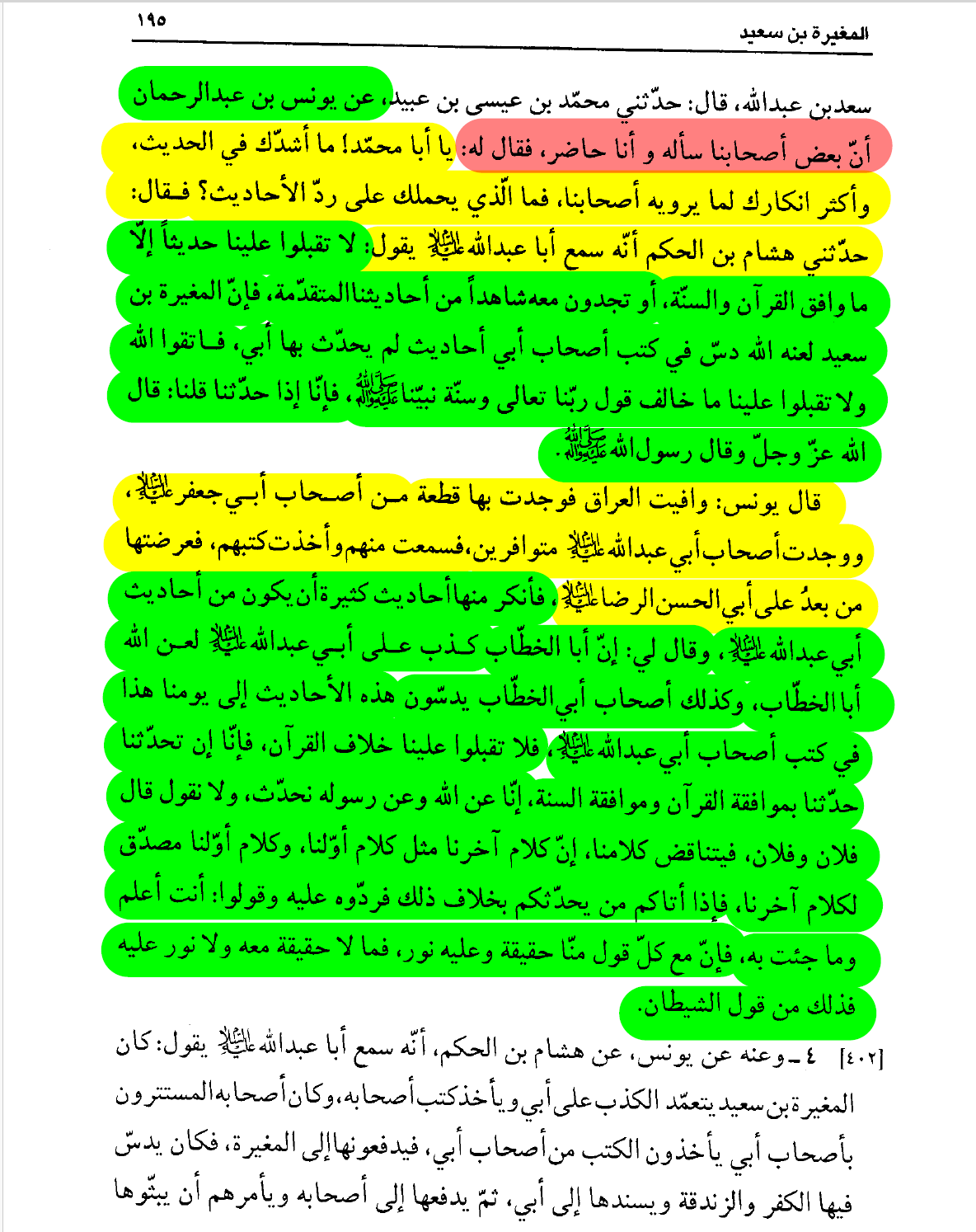
… do not accept in our name anything that goes against the Qur’ān, because when we narrate, we always narrate Aḥādīth that are in agreement with the Qur’ān, and in agreement with the Sunnah, for we only narrate from Allah and His Messenger…
Imam al-Riḍā (as)
Thus, it is clear that much of the Ghuluww that is found in the Shīʿa Imāmī Ḥadīth books is the result of fabrications and interpolations of the Ghulāt which were cleverly and strategically inserted and artificially injected into the original Ḥadīth compilations of the earliest companions of the Imams (as). It is also clear that the only way to detect and get rid of such Ghuluww-based claims is to compare them against the teaching of the Qur’ān and seek external verification from them.
Al-Islaah Vision for the Twelver Imāmī Shīʿa Community
Our aim and effort has been focused on raising awareness about Ghuluww which has been falsely attributed to the Imams of the Ahlul Bayt (as), and we have called for the rejection of all forms and manifestations of it. Consequently, we reject the claim about the Divinity of the Imams (as) as Ghuluww, because it is refuted by the Qur’ān, and the Imams (as) denied it as well.
We reject the attribution of Divine Attributes, Powers, Functions and Offices to them for the same reason.
And we reject the claim that they were Messengers of Allah or Prophets as Ghuluww on the same grounds.
The Imams (as) Rejected Claim of Divine Imāmah for themselves
Similarly, we reject the claim of Divine Imāmah (i.e. Divine Appointment, infallibility, etc.) for them because we are convinced that the Imams (as) never claimed such a station for themselves, due to the fact that there is no clear-cut proof for such claims for them in the Book of Allah or in the statements of the Messenger (s). Moreover, we even have reports from some of the Imams (as) themselves where we find them denying such a position for themselves, and their denials have been documented in Sunnī, Zaydī Shīʿa as well as Twelver Imāmī Shīʿa sources, with the only key difference being that the Taqiyyah card is played by traditional Twelver Imāmīs to negate the Imams’ denials of their Divine Imāmah, and thus their denials are spun and (mis)portrayed as deliberate lies uttered by them due to fear of the authorities, which is interestingly the exact same card the Ghulāt played to negate the Imams’ denials of their divinity and Prophethood.18
Double Standards and Inconsistency of the Twelver Imāmī Sect on Divine Imāmah: Abuse of Taqiyyah Card
Unfortunately, the current day sectarian Twelver Imāmī narrative is not consistent with the teaching of the Ahlul Bayt (as) and their statements on the issue of Imamate. When the Ahlul Bayt (as) reject the claims made about their Divinity and Prophethood, the traditional Twelver Imāmīs authenticate and accept their denial, and mirror it in their own stance.
But when the Imams (as) issue clear statements denying the claim of Divine Imāmah about them, the traditional Twelver Imāmīs resort to playing the Taqiyyah card, and use it to override and cancel the negations of the Imams (as), conveniently overlooking the fact that the Ghulāt who claimed Divinity and Prophethood for the Imams (as) also resorted to playing the Taqiyyah card to override and cancel the Imams’ denials of their blasphemous and heretical claims in this regard.
So if the Taqiyyah card is allowed in, then those who believe in it will also have to accept the Divinity and Prophethood of the Imams, otherwise if they apply it selectively and opt for picking and choosing when to apply it and when not to apply it, then they are guilty of the very inconsistent and unprincipled cherry-picking which they often like to accuse their opponents of.
Consistency would require them to either apply Taqiyyah to the Imams’ denials of all three Ghuluww-based claims like the Ghulāt did, or to reject Taqiyyah in all these three instances the way we do. But to deny Taqiyyah for the first two cases while affirming it for the third case reeks of convenient cherry picking and inconsistent double standards.
If it is said that we reject the claim of Divinity and Prophethood for Imams (as) because it is explicitly negated by the Qur’ān, then it should be known that the Ghulāt had enough gymnastics up their sleeve to work their way around those verses, and they could easily overturn their apparent meanings through Bāṭinī Tafsīr (esoteric exegesis). Besides, it can also be argued that Divine Imamate is negated by the Qur’ān due to God’s declaration that the slaves have no Ḥujjah (proof) against Him after receiving Messengers (Qur’ān 04:165), and thus if we accept the assertion of this verse that God’s Ḥujjah (proof) against the creation is completed by the coming of Messengers, then the very premise on which the doctrine of Divine Imamate after the Prophet (s) is based gets negated by that, because it began with ʿAqlī (rational) arguments about how the earth could not be empty of a Ḥujjah (proof) of God at any time, and therefore one should believe in Divinely Appointed Imams after the Prophet (s) who serve their role as the Ḥujaj (proofs) of God on earth. However, the aforementioned verse is saying that human beings have no Ḥujjah (proof) against God after He sends them Messengers, and since humanity has received its last Messenger in the form of the Prophet (Saww), it no longer as any valid Ḥujjah (proof) or excuse against God, at least from the Qur’ān’s perspective, and so no further Ḥujaj (proofs) are needed.
At any rate, our rejection of the traditional, sectarian, Divine Imāmah narrative will make sense when it is considered in light of the fact that in order to believe in it, one has to accept that the Imams of Ahlul Bayt (as) were, God Forbid, double-faced liars and deceivers, who routinely denied their Divine mandate when they were asked about it by both Sunnis and Shīʿas (like Zaydis) alike, and even hid it from their many of their own siblings and children as is clear from the case of Imam Zayd (as) as well as his brothers such as al-Ḥusain bin ʿAlī bin al-Ḥusayn and ʿUmar bin ʿAlī bin al-Ḥusayn.19
Faced with the choice between:
- Accepting the Imams (as) as Divinely Appointed, Infallible, Guides who routinely denied their Divine Mandate, often going out of the way to do so, disassociating from those who claimed it for them, and lying to, and deceiving, people who came to them asking about this
OR
- Accepting that the Imams (as) were ʿUlamāʾ Abrār (highly erudite, well versed, insightful, wise, and God-fearing scholars and spiritual grand masters) who didn’t lie or deceive, and who were truthful to the core, even when they denied everything from Divinity, to Prophethood, and Divine Imāmah for themselves.20 And they only attributed their knowledge to what they inherited from the prophet through their forefathers.
We choose b), because a) comes at the cost of the honesty, integrity, nobility and trustworthiness of these Imams (as) which are an established reality widely recognised and well accepted within the Ummah. Choosing (a) requires us to throw the moral character and pious role model of these Imams (as) under the bus, and this is why we cannot bring ourselves to accept this cynical and twisted view of them, especially not after all that we know of their piety, steadfastness, and strict adherence to the Qur’ān and the Sunnah of their grandfather, Prophet Muḥammad (s).
The End Goal and Al Islaah Commitment to Work towards it
We have made it clear that we want to go back to the real, original, authentic Islam of the Prophet (s), his Ahlul Bayt (as), and his noble companions from among the Muhājirīn (the emigrants from Makkah to Madīnah from among the Prophet’s companions) and the Anṣār (Helpers from among the Prophet’s companions in Madīnah), and the Tābiʿīn21 (followers who followed them with Iḥsān [goodness and righteousness]) – the Islam of the community in Madīnah during the time of the Prophet (s).
Our methodology for getting there is to apply the Qur’ānic criterion of ʿIlm (clear knowledge and guidance that has the stamp of Divine Sanction and Approval, and which can be known to be approved by Allah with certainty) to ascertain what is part of that Islam and what is not, so whatever Allah informs us of in the Qur’ān in a way that yields certainty and whatever else we are able to ascertain with certainty about that Islam from the sources, we accept and follow, and in areas where that is not possible, we follow the best of what has come to us from the narrations that are in line with the Qur’ān and other established and undisputed realties. And everything that we discover to be a later addition to that Dīn, or the result of foul play, fabrication, interpolation, or mistakes in transmission, we discard and dismiss it.
FOOTNOTES
- Shaykh ʿAbdullāh al-Māmaqānī was born in Najaf in 1290 AH/1873 CE, where he also pursued his education, and passed away there in 1351 AH/1933 CE. He earned a reputation as a leading scholar in the Ḥawzah of Najaf, and taught some very well-known and famous Shia Ayatullahs such as Ayatullah Sayyid Shihābuddīn al-Marʿashī al-Najafī (d. (1411 AH/1990 CE). Shaykh al-Māmaqānī went on to author a massive 39-40 volume encyclopaedia of ʿIlm al-Rijāl entitled Tanqīḥ al-Maqāl fī ʿIlm al-Rijāl in the last years of his life. It is considered to be among the most exhaustive and comprehensive books in its field in view of how its author takes all the Rijālī (biographical) information provided by the earliest and later works of Shīʿa Imāmī ʿIlm al-Rijāl and proceeds to analyse and evaluate it before arriving at a conclusion. It has received high praise and critical acclaim from other scholars of the field such as Ayatullah Aghā Sheikh Buzurg al-Ṭahrānī (1389 AH/1970 CE), the teacher of Ayatullah Sayyid ʿAlī al-Ḥusaynī al-Sīstānī, see his: Al-Dharīʿah Ilā Taṣānīf al-Shīʿa. Dār al-Aḍwā’, Beirut, 3rd ed., 1403 AH/1983 CE., vol. 4, pp. 466-467. [Entry # 2070]. (https://lib.eshia.ir/71603/4/466 – https://lib.eshia.ir/71603/4/467). See also: Al-Subḥānī, Shaykh Jaʿfar. Kulliyāt fī ʿIlm al-Rijāl. Muʾassasat al-Imam al-Ṣādiq (as), Qum, 8th ed., 1440 AH., pp. 136-138. In the earlier edition available online, one may refer to pp. 134-136. (https://lib.eshia.ir/27182/1/134 – https://lib.eshia.ir/27182/1/136).
↩︎ - Al-Māmaqānī, Al-ʿAllāmah Shaykh ʿAbdullāh. Tanqīḥ al-Maqāl fī ʿIlm al-Rijāl. Ed. Shaykh Muḥammad Riḍā al-Māmaqānī. Mu’assasat Āl al-Bayt li Iḥyā’ al-Turāth, Qum, 1431 AH., vol. 2 (Al-Fawā’id al-Rijāliyyah), p. 305. (https://lib.eshia.ir/10510/2/305).
Ayatullah Shaykh Dr. Muḥsin Kadivar points out that the Shaykh al-Māmaqānī repeats and reiterates this observation of his in at least twenty different places throughout his encyclopedia, and he pinpoints those places in the footnotes. See his: Al-Qirā’ah al-Mansiyyah. (Trans. Dr. Saʿd Rustam). Al-Intishār al-ʿArabī, Beirut, 1st ed., 2011 CE., pp. 24-25. For his line by line explanation and analysis of Shaykh al-Māmaqānī’s observation, see: pp. 26-28.
Note: It should also be borne in mind that Shaykh al-Māmaqānī is himself a highly traditional, sectarian scholar, and he only points out this embarrassing fact to mount a defense for the current day Twelver Imāmī belief system. The issue he is trying to defend it against is the reality that looms large in the works of Imāmī Shīʿa Rijāl, which is that: most of the narrations which form the basis for today’s Twelver Imāmī beliefs and Imamology are based on narrations which originate from narrators who were severely discredited by earlier classical Imāmī Shīʿa scholars of Ḥadīth and Rijāl for Ghuluww and ascribing lies to the Imams (as). So if those classical Rijālī gradings are accepted, then that would amount to an admission that today’s version of Twelver Imāmī Shiaism is the product of the fabrications of Ghulāt (extremist exaggerators) or at least heavily influenced by them. To avoid this embarrassing conclusion and admission, Shaykh al-Māmaqānī seeks to convince his readers to dismiss and ignore the Rijālī gradings of the classical Imāmī scholars of Ḥadīth and Rijāl, by pointing out that by their strict standards, most of the current-day, contemporary Twelver Imāmī Shīʿa scholars and lay people alike, would be Ghulāt (extremists).
We have explained this point in the very first episode of the Ghuluww series entitled: Dispelling the Darkness of Ghuluww with the light of Quran – Syed Ali Hur Kamoonpuri | Introduction https://www.youtube.com/watch?v=KlPizrvKZP4.
↩︎ - Al-Māmaqānī, Tanqīḥ al-Maqāl fī ʿIlm al-Rijāl, vol. 6, p. 340. (https://lib.eshia.ir/10510/6/340).
↩︎ - Al-Burūjerdī, ʿAllāmah Sayyid ʿAlī Aṣghar. Ṭarāʼif al-Maqāl fī Maʿrifah Ṭabaqāt al-Rijāl. Ed. Sayyid Mahdī al-Rajāī. Maktabat Ayatullah al-Marʿashī al-Najafī al-ʿĀmmah, Qum, 1st ed., 1410 AH., vol. 2, p. 356. (https://lib.eshia.ir/14030/2/356).
↩︎ - Al-Subḥānī, Shaykh Jaʿfar. Kulliyāt fī ʿIlm al-Rijāl. Muʾassasat al-Imam al-Ṣādiq (as), Qum, 8th ed., 1440 AH., p. 260. In the earlier edition of this book available online, see: p. 250. (https://lib.eshia.ir/27182/1/250).
↩︎ - Another famous narrator who stands accused of Ghuluww (ideological extremism). One may refer to the Rijālī entry on him in: Ibn al-Ghaḍāʾirī, Aḥmad bin al-Ḥusayn. Al-Rijāl. Ed. Sayyid Muḥammad Riḍā al-Ḥusaynī al-Jalālī. Dār al-Ḥadīth, Qum, 1st ed., 1422 AH., p. 87. [Entry # 116-1]. (https://lib.eshia.ir/27444/1/87).
A rather poor but nonetheless passable English translation of this entry can be accessed from: https://thaqalayn.net/chapter/17/20/2.
↩︎ - A doctrine invented by Ghulāt whereby they claimed that Allah had delegated the affairs of the universe to the Prophet (s) and Ahlul Bayt (as), so that they create, sustain, give life and death, with Allah’s authorisation and due to His delegation.
↩︎ - Al-Māmaqānī. Tanqīḥ al-Maqāl fī ʿIlm al-Rijāl, vol. 9, p. 194, quoting from his published Taʿlīqah (Annotated Commentary) on the margins of Manhaj al Maqāl, p. 54. (https://lib.eshia.ir/10510/9/194).
↩︎ - Al-Ṭūsī, Shaykh Abū Jaʿfar Muḥammad bin al-Ḥasan. Ikhtiyār Maʿrifat al-Rijāl (Known as Rijāl al-Kashshī). Ed. Jawād al-Qayūmī al-Iṣfahānī. Muʾassasat al-Nashr al-Islāmī al-Tābiʿah li Jamāʿat al-Mudarrisīn bi Qum al-Musharrafah, Qum, 1st ed., 1427 AH., p. 271. Narration # 587/7. In ʿAllāmah Ḥasan al-Musṭafawī’s edition published by Muʾasseseh Nashr Daneshgah-e Mashhad, Mashhad, 1st ed., 1409 AH, see: vol. 1, p. 323. (https://lib.eshia.ir/10241/1/323).
Authentication: The content of this narration has been authenticated by Sayyid Mūhammad Riḍā al-Sīstānī. See: Qabasāt min ʿIlm al-Rijāl. (Compiled by Sayyid Muḥammad al-Bakkā’). Dār al-Muʾarrikh al-ʿArabī, Beirut, 1st ed., 1437 AH/2016 CE., vol. 1, p. 551. (Entry on Narrator # 89 al-Mufaḍḍal bin ʿUmar). (https://ar.pdf.lib.eshia.ir/97903/1/551).
He observes that the chain of this narration doesn’t have any narrator who is unverified except for the Shaykh from whom al-Kashshī takes, however he argues that because the content of this narration is corroborated by other narrations, it is not far-fetched to have assurance in the veracity of the statement of Imam al-Ṣādiq (as) which has been quoted in it.
For us, the content and import of this narration is also acceptable because it is verified by the Qur’ān which makes it abundantly clear that it is only Allah (SWT) who apportions and allocates the sustenance of all creatures and provides for them from across Ghayb. See: Qur’ān: 11:06; 13:26; 17:30; 28:82; 29:62; 30:37; 34:36, 39; 39:52; 42:12. It is therefore clear Shirk to claim this exclusive Divine Prerogative for any slave, and hence the answer of Imam al-Ṣādiq (as) quoted in this narration is perfectly in line with the teaching of the Qur’ān as well as other numerous reliable-chain narrations from him negating the various Divine powers, attributes and offices which the Ghulāt (extremist and deviant ideologues) were seeking to attribute to him.
↩︎ - ibid., pp. 193-194. [Narration # 398/1]. In ʿAllāmah Ḥasan al-Musṭafawī’s edition published by Muʾasseseh Nashr Daneshgah-e Mashhad, Mashhad, 1st ed., 1409 AH, see: vol. 1, pp. 222-223. (https://lib.eshia.ir/10241/1/222 – https://lib.eshia.ir/10241/1/223). The central claim of this narration is supported by several verses of the Qur’ān such as 10:31; 27:64; 34:24. See the previous footnote also.
↩︎ - See YouTube Video entitled: LIVE – The Heart of hope – The Youth Islamic Service – Dar Es Salaam / Tanzania Streamed live on Mar 12, 2022 on the Official Imam Hussein TV 3 YouTube channel https://www.youtube.com/watch?v=UpiGhoJeooM Timestamp 2:30:58 – 2:31:32. This has also been made into a separate clip and can be accessed from: https://www.youtube.com/watch?v=lQCJWujHuF0.
For our expose on this, one may visit the following Al-Islaah broadcast: Poets TAKING OVER the Shia & Khoja Communities | Response to Sheikh Ali Karmali | Dr. Syed Ali Hur https://www.youtube.com/watch?v=PAlJZFcuuPc.
↩︎ - That is to say they attribute Allah’s Unique Divine Powers, Attributes and Functions such as creating, sustaining, giving life and death, and administering the affairs of the universe to Imams (as) who are merely slaves of Allah, and who have not been empowered to perform any such functions as per their own testimonies.
↩︎ - Al-Ṭūsī, Shaykh al-Ṭā’ifah Abū Jaʿfar Muḥammad bin al Ḥasan. Al-Amālī. Ed. Muʾassasat al-Biʿthah. Dār al-Thaqāfah, Qum, 1st ed., 1414 AH., p. 650. [Majlis # 33; Narration # 1349/12]. (https://lib.eshia.ir/27725/1/650).
The content of this narration is widely accepted among Twelver Imāmī scholarship and is frequently cited by them in discussions of Ghuluww. See for instance: Al-Subḥānī, Shaykh Jaʿfar. Kulliyāt fī ʿIlm al-Rijāl. Mu’assasat al-Imam al-Ṣādiq (as), Qum, 8th ed., 1440 AH., p. 99; Al-Ṭehrānī, Ayatullah Shaykh Dr. Muḥammad al-Ṣādeqī. Al-Furqān fi Tafsīr al-Qur’ān bi al-Qur’ān wa al-Sunnah. Al-Amīrah Li Ṭibāʿati wa al-Nashr wa al-Tawzīʿ, Beirut, nd., vol. 9, p. 66.
↩︎ - Al-Māmaqānī. Tanqīḥ al-Maqāl fī ʿIlm al-Rijāl, vol. 22, pp. 227-228. (https://lib.eshia.ir/10510/22/227 – https://lib.eshia.ir/10510/22/228).
↩︎ - ibid., vol. 2 (Al-Fawā’id al-Rijāliyyah), p. 305. (https://lib.eshia.ir/10510/2/305).
↩︎ - Al-Ṭūsī. Ikhtiyār Maʿrifat al-Rijāl (Known as Rijāl al-Kashshī). Ed. Jawād al-Qayūmī al-Iṣfahānī. Muʾassasat al-Nashr al-Islāmī al-Tābiʿah li Jamāʿat al-Mudarrisīn bi Qum al-Musharrafah, Qum, 1st ed., 1427 AH., p. 102. [Narration # 172].
In the edition available online and edited by ʿAllāmah Ḥasan al-Musṭafawī, and published by Mu’asseseh Nashr Daneshgah-e Mashhad, Mashhad, 1st ed., 1409 AH., vol. 1, p. 107. (https://lib.eshia.ir/10241/1/107).
Authenticated by Āyatillāh al-Shaykh Āṣif Muḥsinī; see: See: Muḥsinī, Ayatullah Shaykh Muḥammad Āṣif. Muʿjam al-Aḥādīth al-Muʿtabarah. Dār al-Nashr al-Adyān, Qum, 2nd ed., 1437 AH., vol. 2, p. 100. (https://lib.eshia.ir/11775/2/100).
See also: Al-Fahdāwī, Shaykh ʿAmmār & Ḥubbullāh, Shaykh Ḥaydar, Al-Muʿtabar min Bihār al-Anwār Wafqan li-Naẓariyāt Āyatillāh al-Shaykh Āṣif Muḥsinī, Dār al-Maḥajjah al-Bayḍāʾ, Beirut, 1437 AH/2016 CE., vol. 1, p. 408. Narration # 681/3.
See also: Rijāl al-Kashshī, p. 194. Narration # 400/2. (https://lib.eshia.ir/10241/1/223), and p. 253. Narration # 542/34. (https://lib.eshia.ir/10241/1/302). The content of this narration is authenticated by the previous one.
And also: Al-Kulaynī, Abū Ja’far Muḥammad bin Yaʿqūb. Al Kāfī, (Ed. ‘Alī Akbar al-Ghaffārī). Dār al-Kutub al-Islāmiyyah (Maktabah al-Ṣadūq), Tehran, 2nd ed., 1381 AH., vol. 2, p. 76. (https://lib.eshia.ir/11005/2/76).
Authentication: The chain of this narration is Mursal, however, its content in general, and the definition of Ghuluww given in it in particular, is authenticated by the previous narrations which we have referred to above. Its content has also been deemed sound and reliable by numerous Shīʿa scholars who cite it and base conclusions on it in their writings and discourses. See for instance: Khomeinī, Imām. Forty Ḥadīths : An Exposition of Ethical and Mystical Traditions. (Tr. Maliqā Qarai and ʿAlī Qulī-Qarā’ī. The Institute for Compilation and Publication of Imām Khomeinī’s Works (International Affairs Department) in collaboration with Ansariyan Publications, Qum, 2003., p. 561. (Commentary on Ḥadīth # 33).
We have presented and authenticated these narrations in the lecture entitled: Why is Believing in Divine Imamah Ghuluww? | Dr. Syed Ali Hur Kamoonpuri (https://www.youtube.com/watch?v=pFIXvuYcOlw). See also: Lecture entitled: Review of: Are Majority of Shia Ahadith narrated by Mughaalis? | Dr. Syed Ali Hur Kamoonpuri (https://www.youtube.com/watch?v=pr_-lz55598).↩︎
- al-Ṭūsī, Shaykh Abū Jaʿfar Muḥammad bin al-Ḥasan. Ikhtiyār Maʿrifat al-Rijāl (Known as Rijāl al-Kashshī). Ed. Jawād al-Qayūmī al-Iṣfahānī. Muʾassasat al-Nashr al-Islāmī al-Tābiʿah li Jamāʿat al-Mudarrisīn bi Qum al-Musharrafah, Qum, 1st ed., 1427 AH., pp. 194-195. [Narration # 401/3]. In the edition available online edited by ʿAllāmah Ḥasan al-Musṭafawī, and published by Muʾasseseh Nashr Daneshgah-e Mashhad, Mashhad, 1st ed., 1409 AH., see: vol. 1, pp. 224-225. (https://lib.eshia.ir/10241/1/224 – https://lib.eshia.ir/10241/1/225).
Authentication: This narration has been authenticated by numerous high profile Marājiʿ in their advanced level Baḥth al-Khārij discourses on ʿIlm al-Uṣūl. These include, but are not limited to:
– Ayatullah Sayyid Abū al-Qāsim Al-Khū’ī (d. 1413 AH/1992 CE). See his: Muʿjam Rijāl al-Ḥadīth wa Tafṣīl Ṭabaqāt al-Ruwāt. Mu’assasat Al-Khū’ī al-Islāmīyyah, Najaf, n.d., vol. 15, p. 268. (https://lib.eshia.ir/14036/15/268).
– Ayatullah Sayyid ʿAlī al-Ḥusainī al-Sīstānī. See: al-Hāshimī, Sayyid Hāshim. Taqrīrāt fī ʿIlm al-Uṣūl – Taʿāruḍ al-Adillah wa Ikhtilāf al-Ḥadīth – Taqrīran li Abḥāth Āyatillāh al-Sayyid ʿAlī al-Ḥusainī al-Sīstānī (Transcripts of Baḥth al-Khārij Lectures). Ismāʿīlīyān, Qum, 1st edition, 1441 AH., vol. 1, pp. 433-434.
– Āyatullāh Sayyid Muḥammad Saʿīd al-Ṭabāṭabāʾī al-Ḥakīm. See his: Al-Muḥkam fī Uṣūl al-Fiqh. Mu’assasat al-Manār, Qum, 1st ed., 1414 AH/1994 CE., vol. 3, p. 213. (https://lib.eshia.ir/13012/3/213).
↩︎ - For evidence of how Ghulāt showed interest in using Taqiyyah to defend their exaggerated claims about Imams after the Imams issued denials against them, one may refer to: al-Ṭūsī, Shaykh Abū Jaʿfar Muḥammad bin al-Ḥasan. Ikhtiyār Maʿrifat al-Rijāl (Known as Rijāl al-Kashshī). Ed. Jawād al-Qayūmī al-Iṣfahānī. Muʾassasat al-Nashr al-Islāmī al-Tābiʿah li Jamāʿat al-Mudarrisīn bi Qum al-Musharrafah, Qum, 1st ed., 1427 AH., pp. 247-248. [Narration # 519].
(https://lib.eshia.ir/10241/1/294 – https://lib.eshia.ir/10241/1/295).
↩︎ - The narrations which showcase this reality have been presented and analysed in quite some depth and detail in lectures broadcast by the Al-Islaah Channel such as:
• Why is Believing in Divine Imamah Ghuluww? | Dr. Syed Ali Hur Kamoonpuri
https://www.youtube.com/watch?v=pFIXvuYcOlw
• The Accusation of Taqiyyah against the Ahlul Bayt | Dr. Syed Ali Hur Kamoonpuri
https://www.youtube.com/watch?v=n-cONuCYbCY
A discussion of how and why the Imams of the Ahlul Bayt (as) opposed the claim of Divine Imaamah for themselves and rejected it can also be found in the following lecture:
KHOJA HERITAGE: Re-awakening of Another Generation
https://www.youtube.com/watch?v=XL32L0SpqBk
See the following Timestamps:
1:13:32 Imam Zayd told Saahib al-Taaq that Imams were not appointed by God
1:29:36 Another incident of Saahib al-Taaq wherein Imam admonished him about Qiyaas (deductive analogy)
1:35:19 Divine Imamah is based on Qiyaas because there is no revelation about it
↩︎ - This view represents a respectable position held by some even within contemporary Twelver Imāmī scholarship. See: Ḥobbullah, Shaykh Ḥaidar. Iḍāʾāt fī al-Fikr wa-al-Dīn wa-al-Ijtimāʿ. Muʾassasat al-Buḥūth al-Muʿāṣirah, Beirut, 1st ed., 1434 AH/2013 CE., vol. 1, pp. 47-48. An English translation of this scholarly response can be accessed from: https://iqraonline.net/three-contemporary-approaches-to-understanding-the-imamah/.
↩︎ - We are using this term in its Qur’ānic sense to refer to those who accepted Islam at a later stage in the Prophet’s lifetime (see: Qur’ān: 09: 100; 59: 10) , not the popular sense in which the generation after the Ṣaḥābah (companions) and those who met them came to be referred to by this term in common usage.
↩︎

